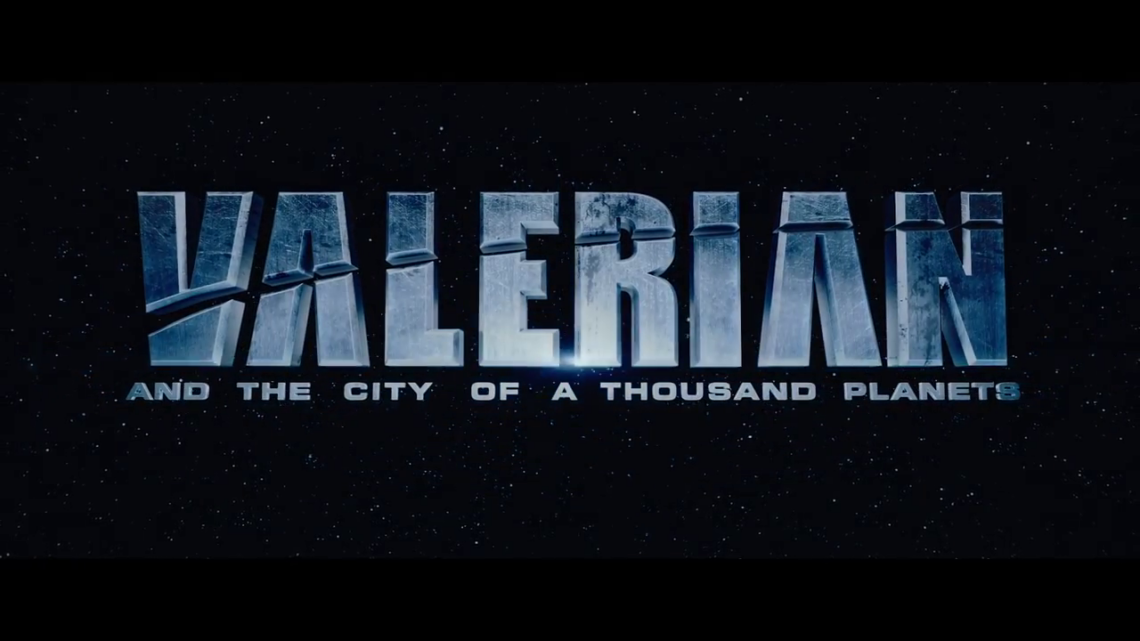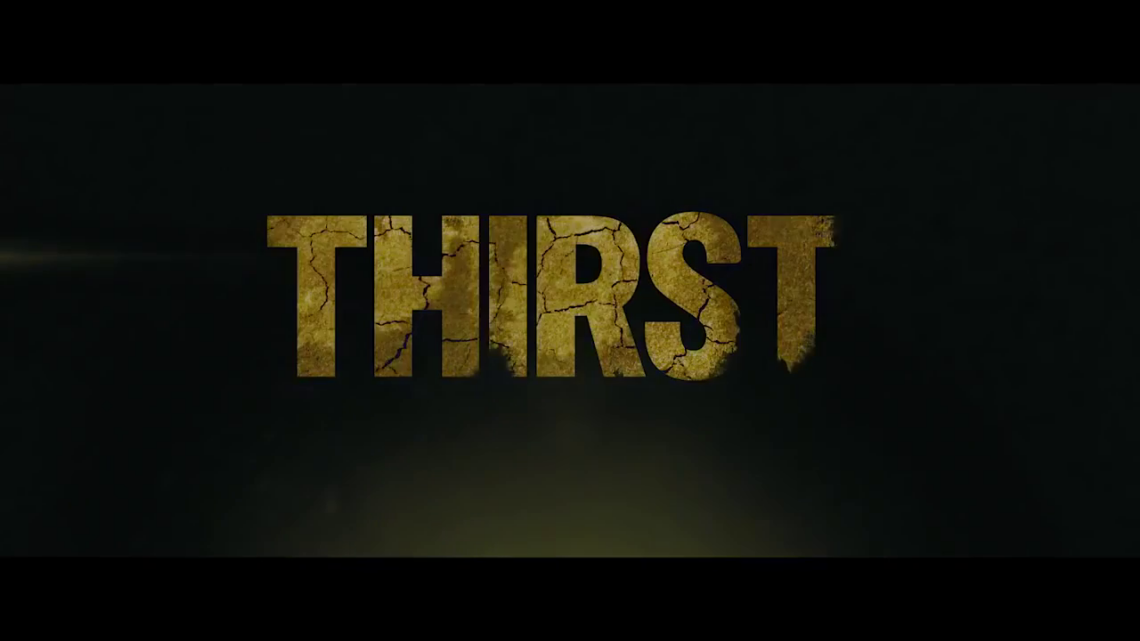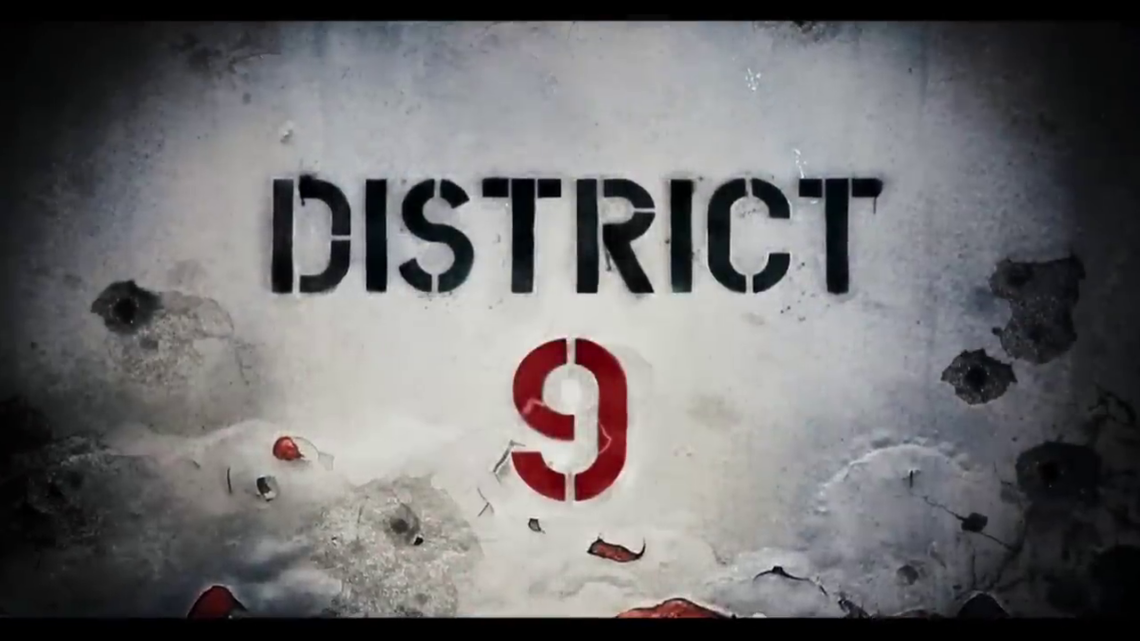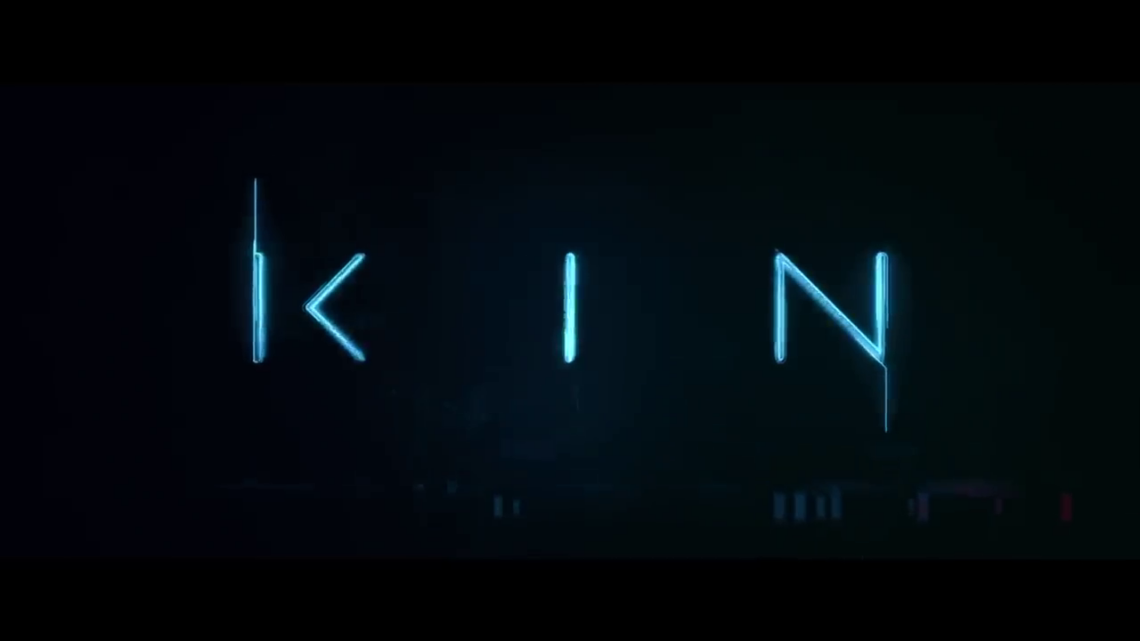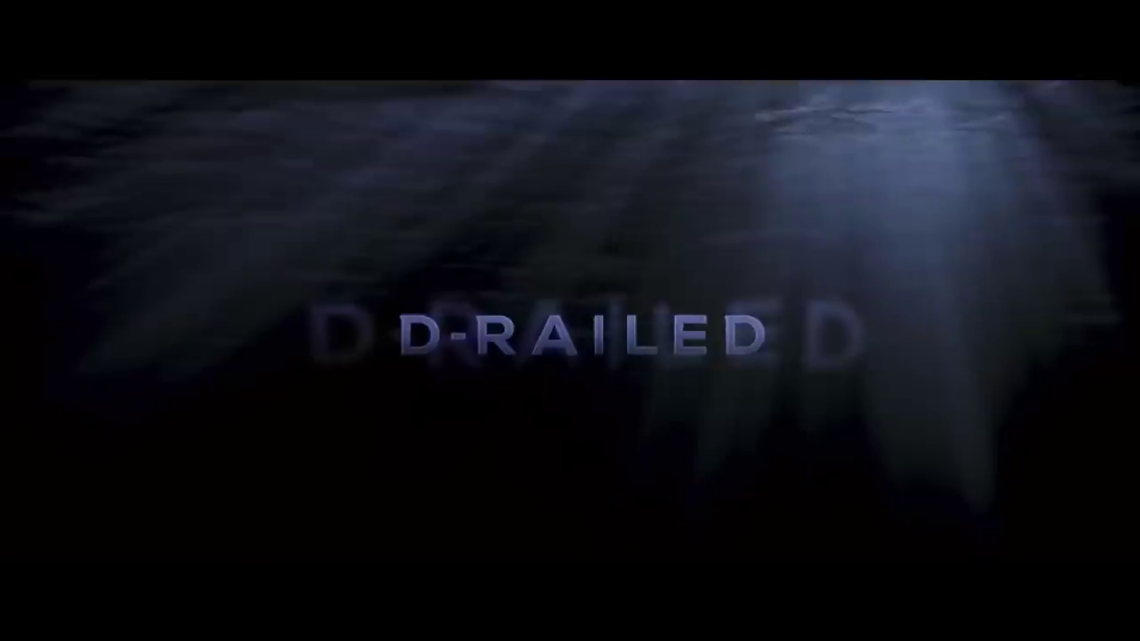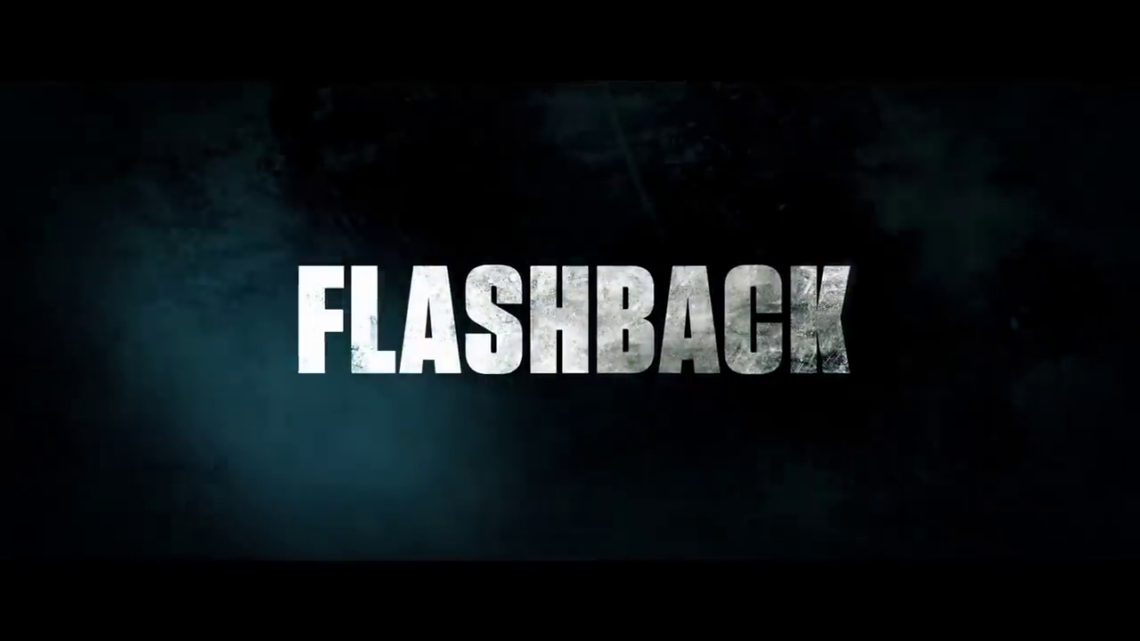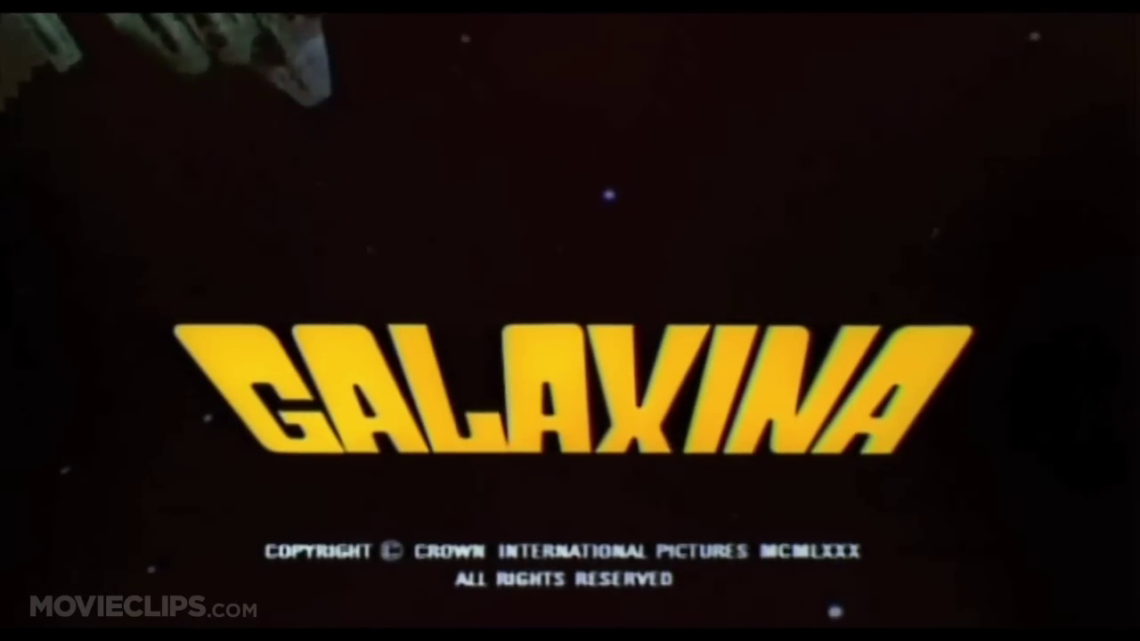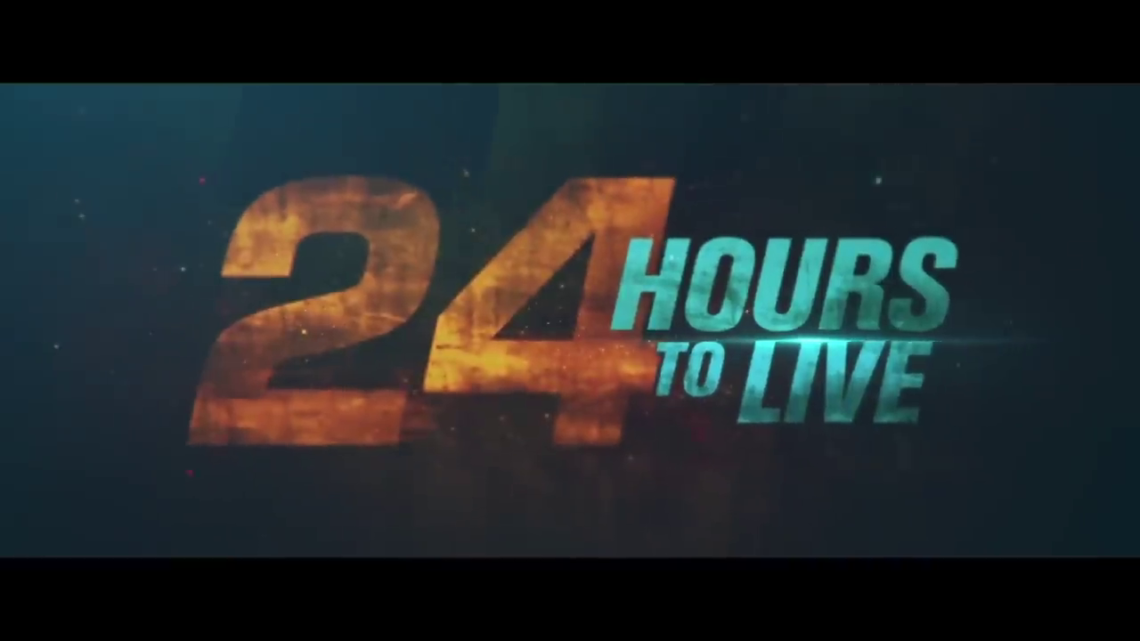-
#621 – Valerian and the City of a Thousand Planets (2017)
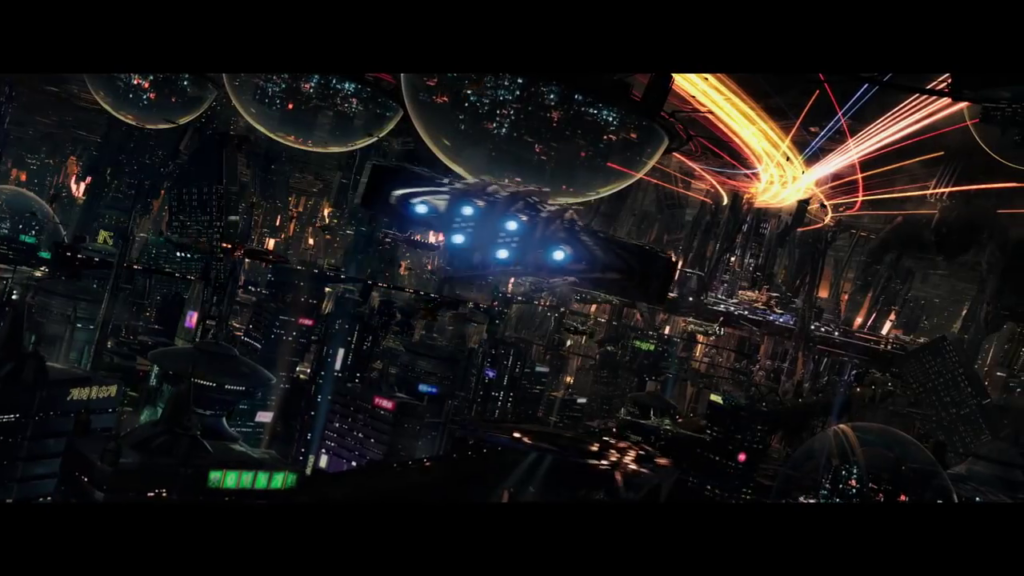
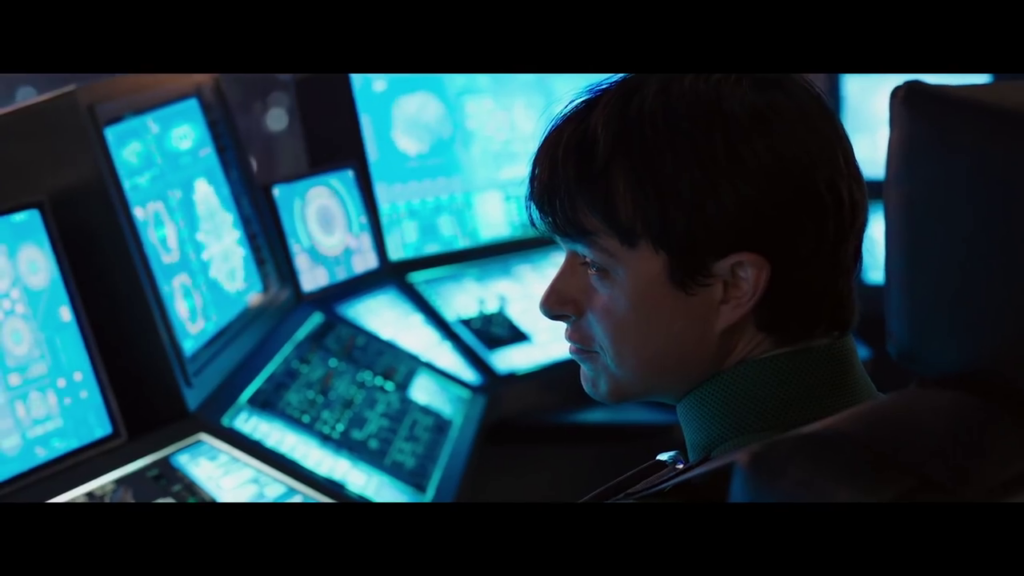
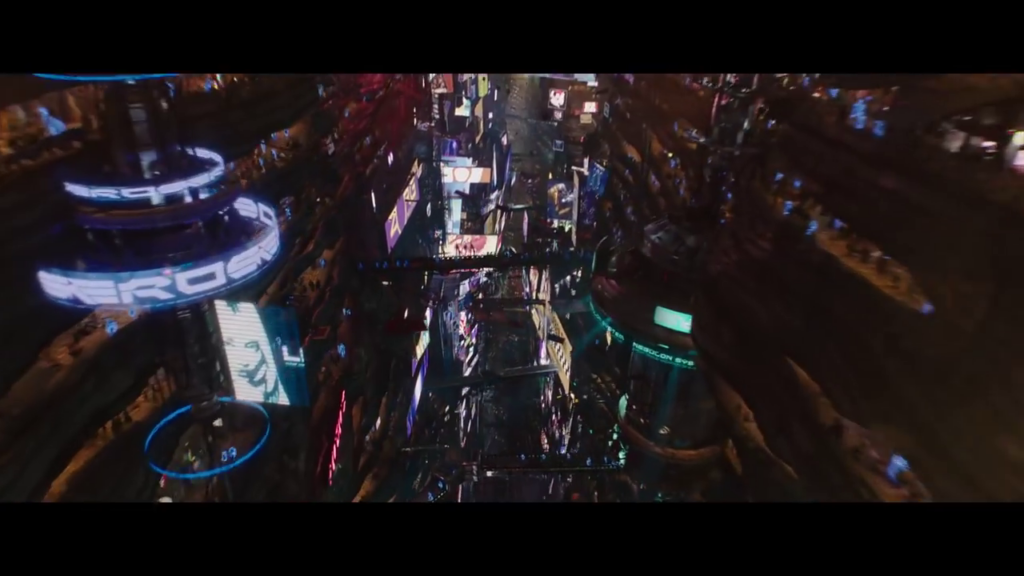
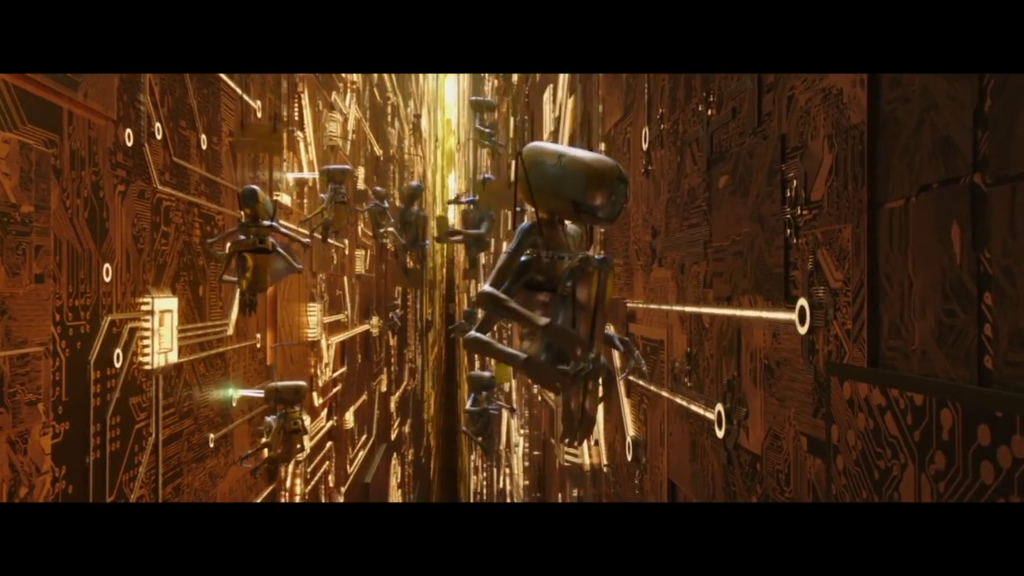
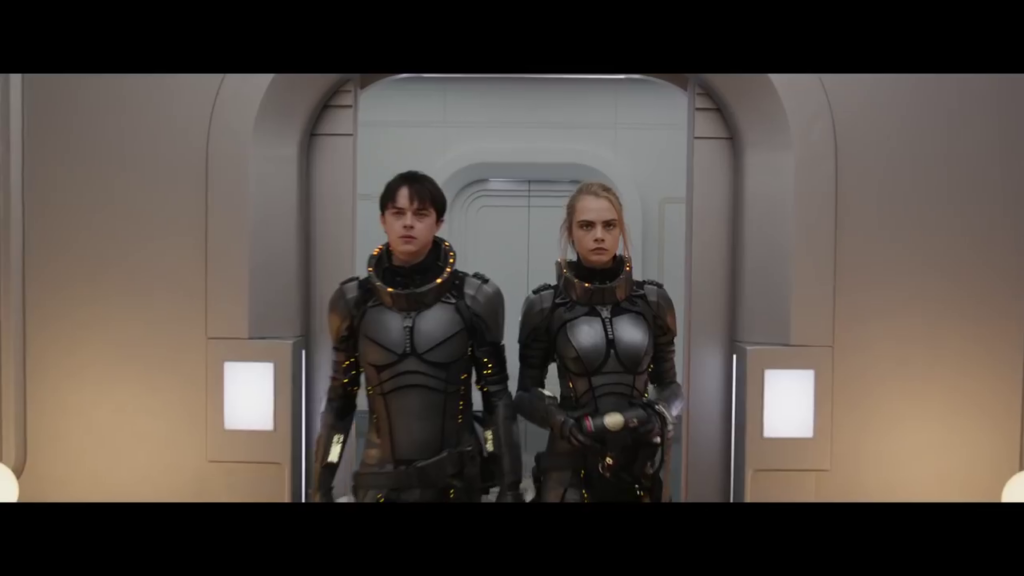
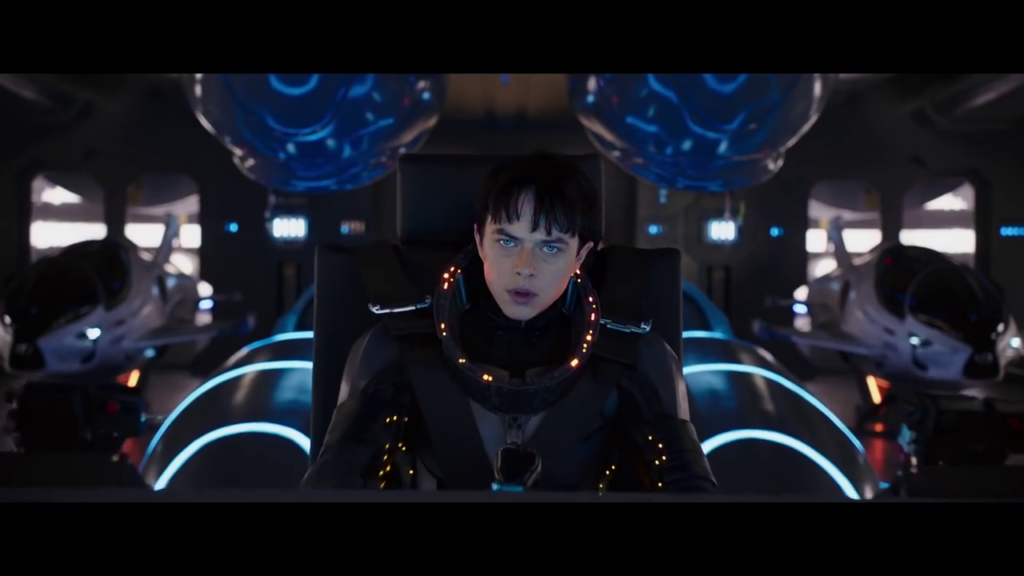
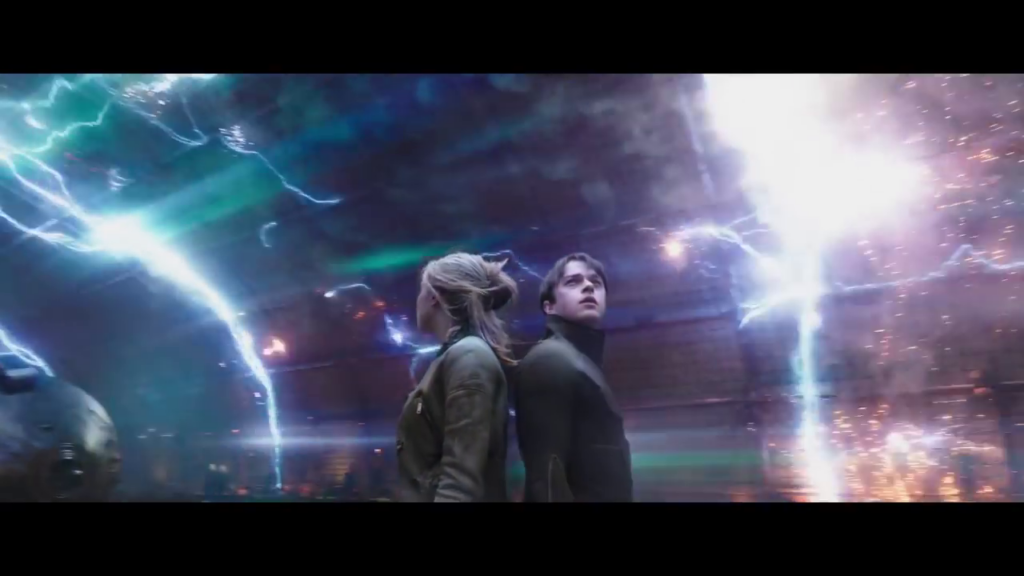
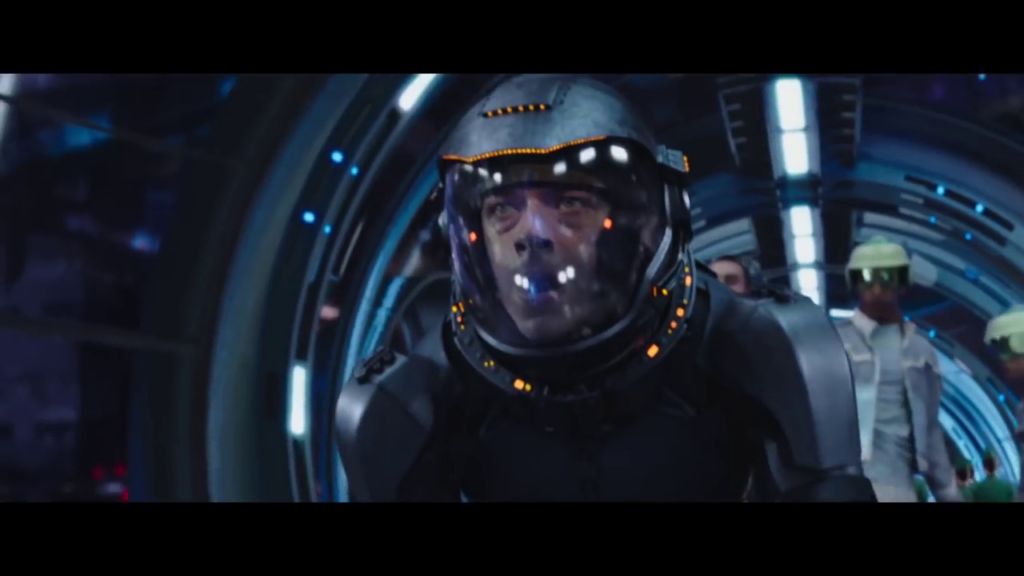
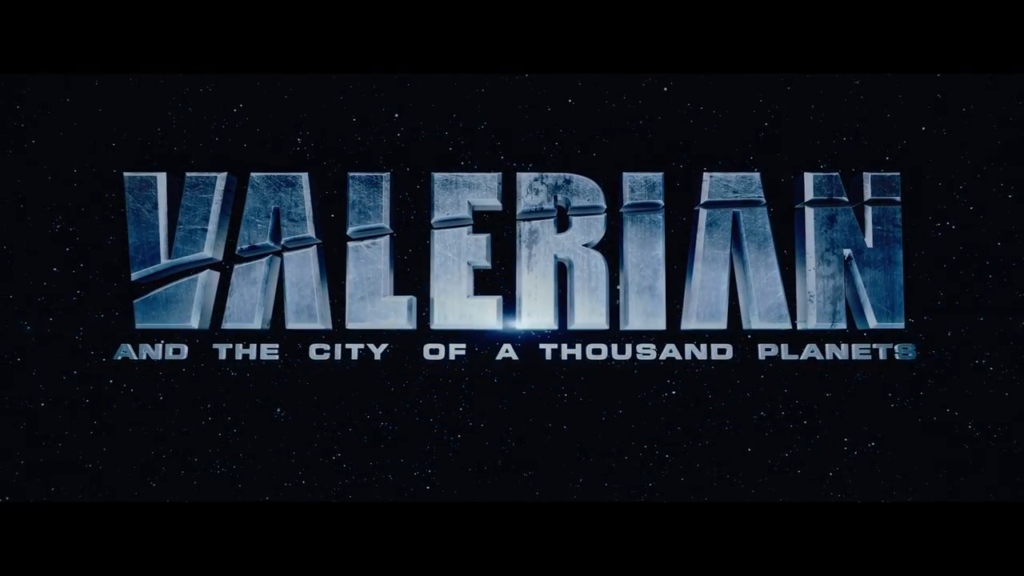
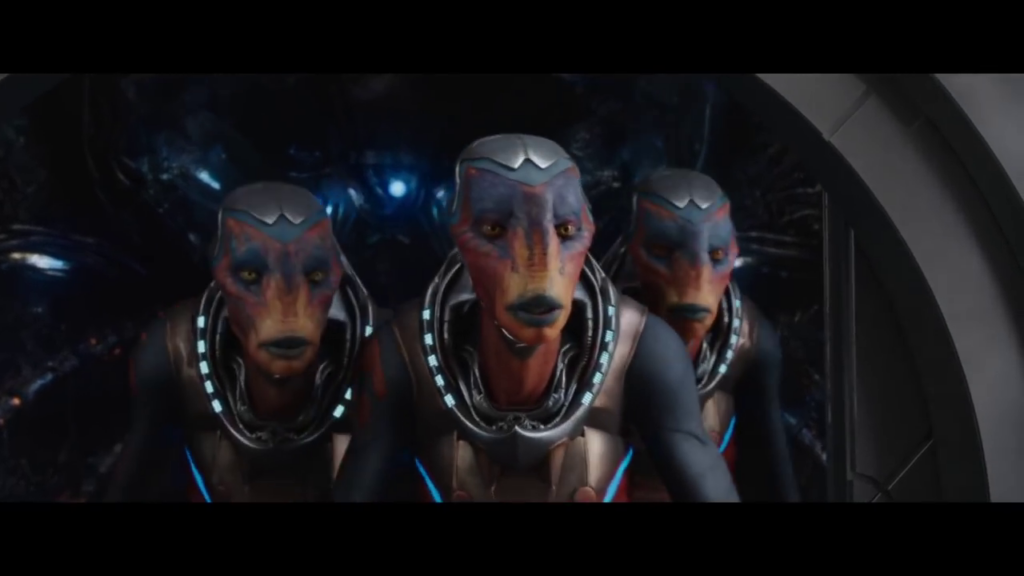
Valerian and the City of a Thousand Planets (2017)
Film review #621
Director: Luc Besson
SYNOPSIS: Alpha is a vast artificial city in space that houses over a thousand different species from across the galaxy. When a mysterious radiation threatens the city, military operatives Major Valerian and Sergeant Laureline are tasked with saving the city, and in doing so, uncover a dark secret that someone is trying to keep buried…
THOUGHTS/ANALYSIS: Valerian and the City of a Thousand Planets is a 2017 film based on the graphic novels of the same name. Humans built a city in space named Alpha, which gradually became home to many different species of aliens as well, and when it became too large, a plan was made to launch it from the Earth’s orbit into space. Some centuries later, the city is home to over a thousand species. Two members of the human military, Valerian and Laureline, are assigned a top secret mission to find out the cause of a radiation leak at the heart of the station that will overwhelm the station in a month unless they can stop it. Directed by Luc Besson (The Fifth Element), the film clearly owes its greenlighting thanks to the success of James Cameron’s Avatar in the sense of having CG non-humanoid aliens being a focus of the film. This is particularly prevalent in the opening scene, which focuses on a race of blue aliens clearly reminiscent of the Na’Vi. This really is a film of two halves: in the first half, we get introduced to the city of Alpha and all of it’s inhabitants, and we get a look at all the creative designs for the different species that reside in the city. We are also introduced to our main characters Valerian and Laureline, two soldiers in the human army, and a story that isn’t too original, but has enough urgency and energy to get things moving. The second half of the film in terms of story really starts to flag, as it resorts to more typical scenarios that don’t offer quite as much excitement. It’s still reasonably entertaining, but you can tell it is playing it safe by falling into using typical tropes. Even with the success of Avatar, perhaps the mainstream filmgoer wasn’t ready for something too alien.
One of the main threads of the film is the relationship between Valerian and Laureline, and the latter’s reluctance to accept the former’s advances. You know that she’ll eventually give in, and the film offers no surprises in that regard, but the journey getting there isn’t told as well as it could be: Laureline says Valerian needs to “grow up” and understand “what love is,” but it never feels like he makes that growth as a character, and she just…accepts him. Despite the strength of her character, she does fall into the role of getting kidnapped for a chunk of the film, and although it does try to not paint her as a damsel in distress, ultimately, that’s evidently what the film does. Dane DeHaan’s performance as Valerian delivers the cheeky rogue-ish elements of his character, but lacks the emotional depth and growth in his performance to underpin the main character’s relationships, as it doesn’t feel like he achieves the growth the film tries to portray he has. The rest of the supporting cast are fine, and don’t really stand out too much. Rihanna as “Bubbles,” a shapeshifting alien, is of note just because of how shoe-horned into the film it feels like it is. The film literally stops while she does a two minute-dance number, and she just shares the screen time until Laureline is rescued and she dies, being never mentioned again. It’s…a cameo that wasn’t necessary but someone obviously wanted in there.
In terms of effects and CG, it’s certainly impressive in terms of scale and creativity. Over two hundred species were designed and feature in the film in some way, and while we don’t get much depth into most of these aliens, we certainly get a more interesting variety than we do in Avatar. The action scenes are fast, colourful, and showcase more of the alien designs, but I can’t help but feel like this diversity could have been weaved more into the story somehow, as despite all of these alien species, the film focuses a lot on human affairs and leaves the aliens in the background. Overall, Valerian and the City of A Thousand Planets looks good, showcases a lot of creativity, and is fast-paced and entertaining, but equally is hampered by a fairly flat script full of unoriginal plot points, and a lead performance that doesn’t hit the notes it needs to. Fairly balanced between its positive and negatives, but entertaining enough to sit through despite its flaws.
-
#620 – Thirst (2015)
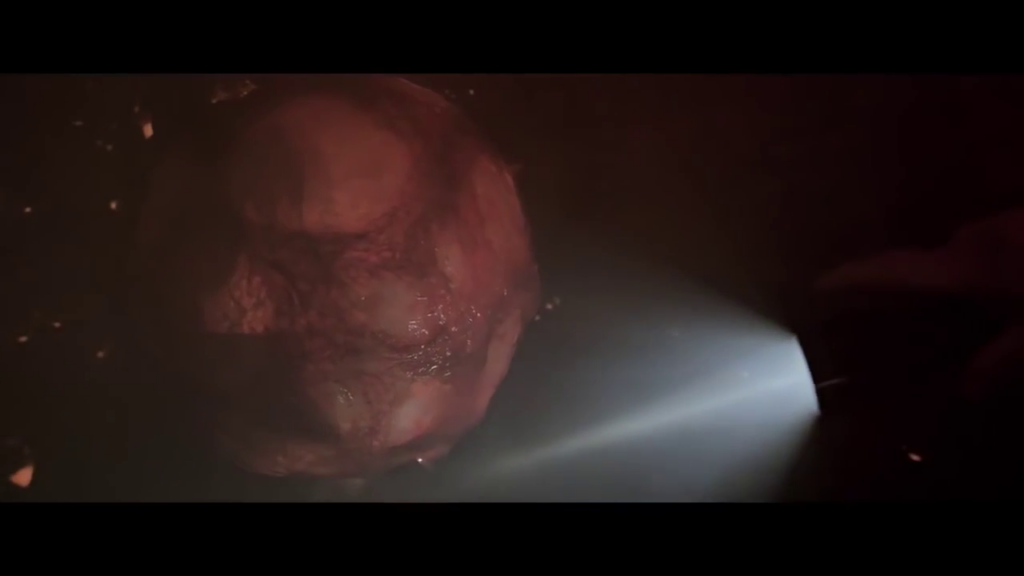
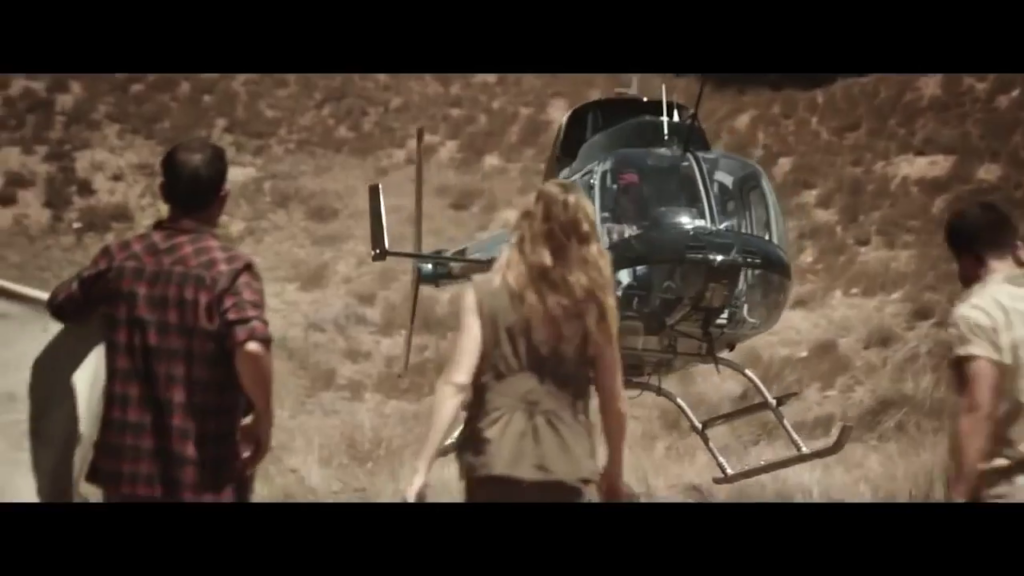
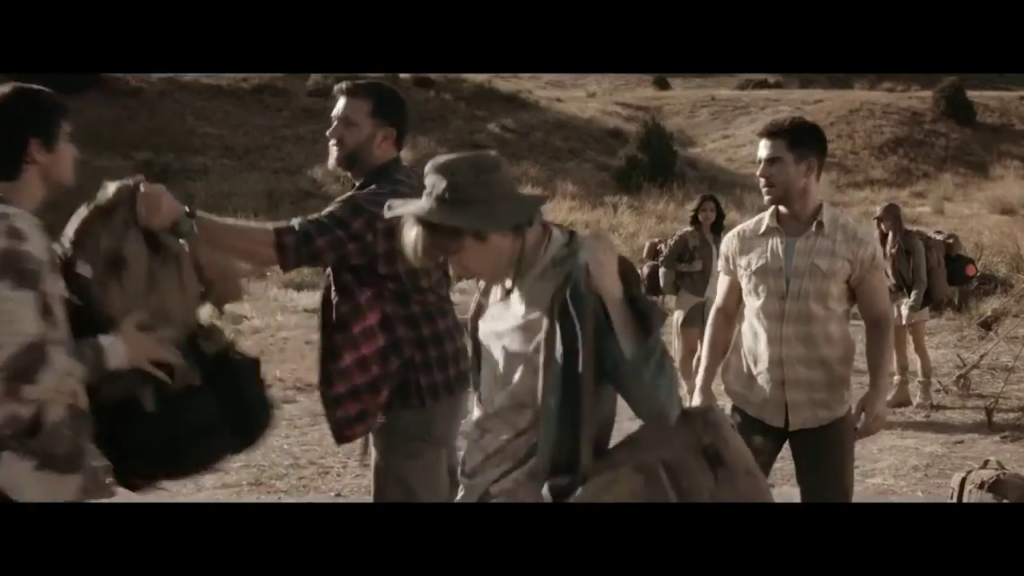
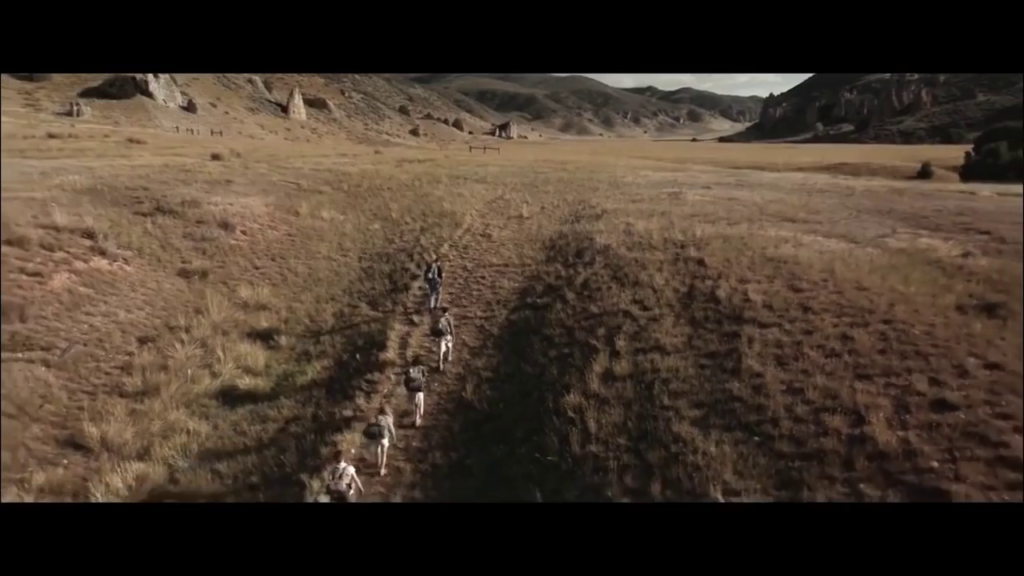
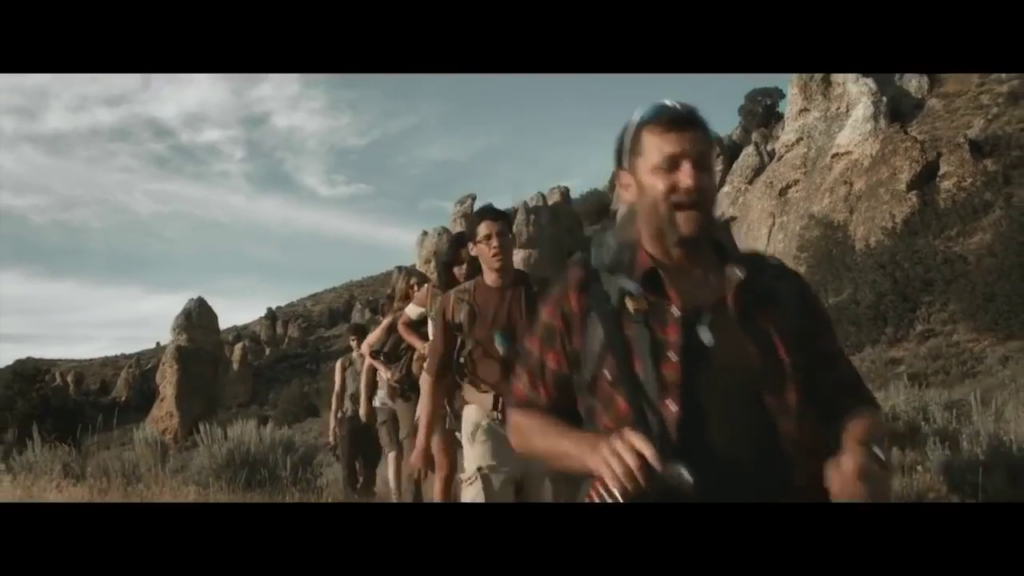
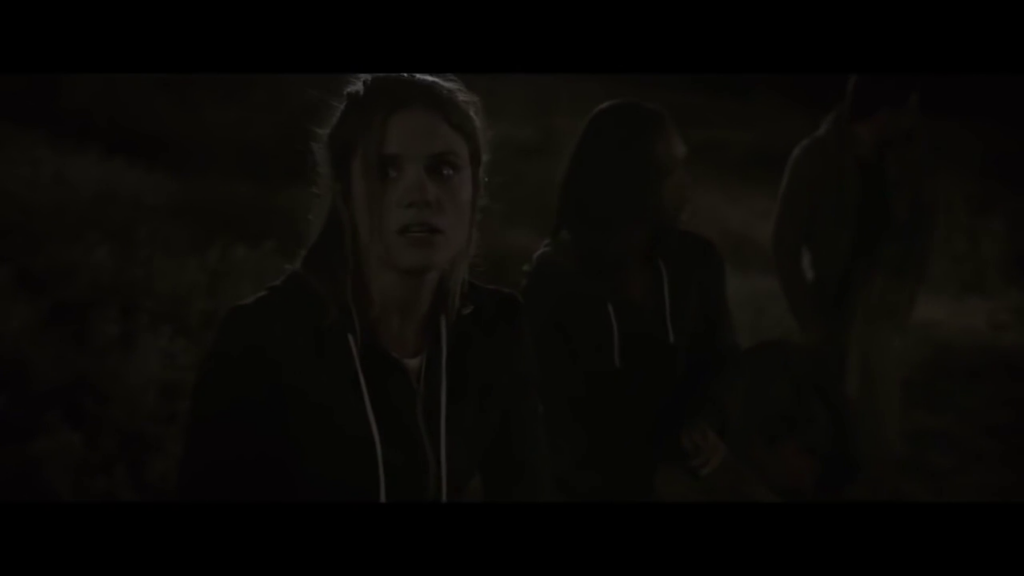
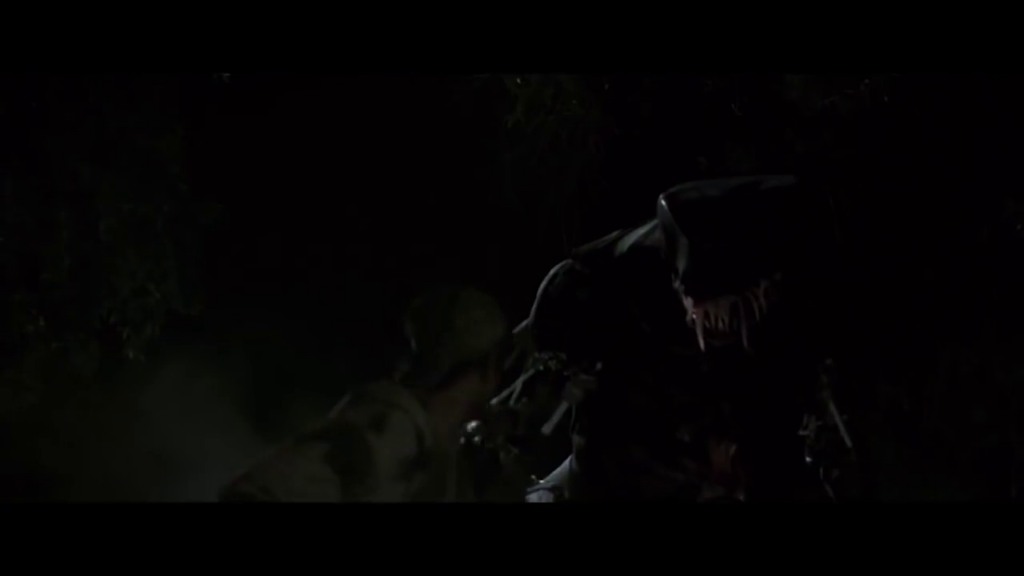
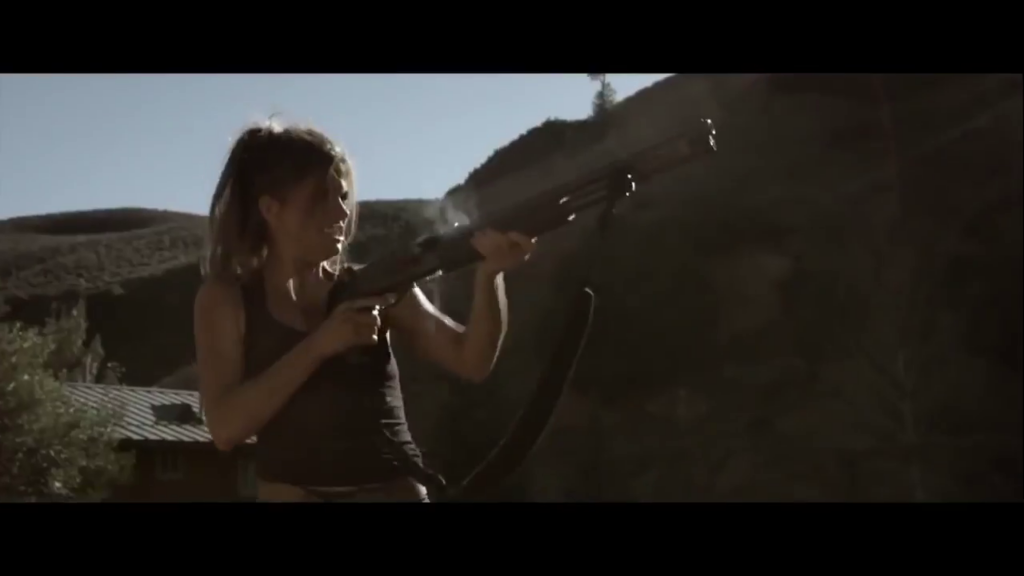
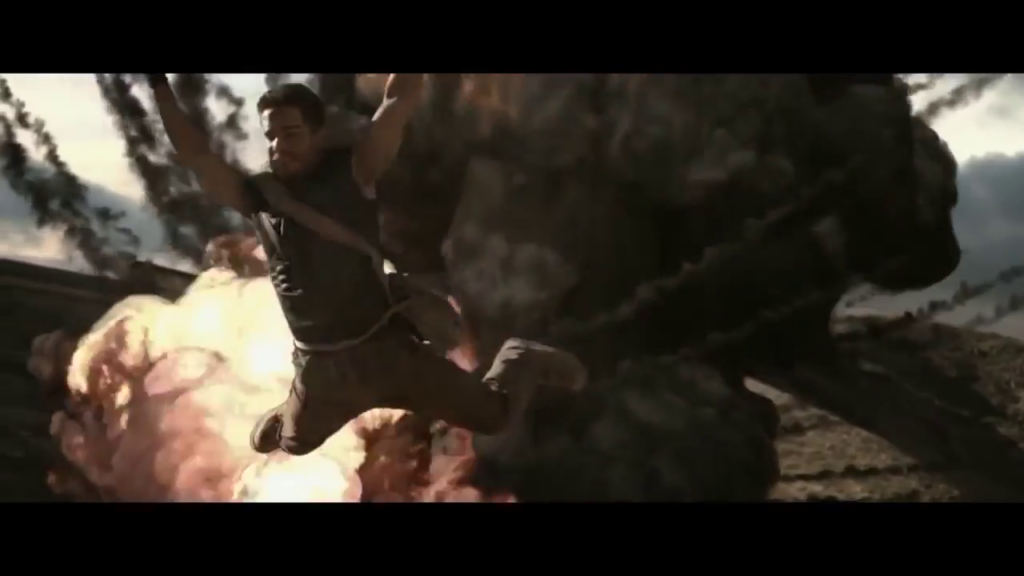
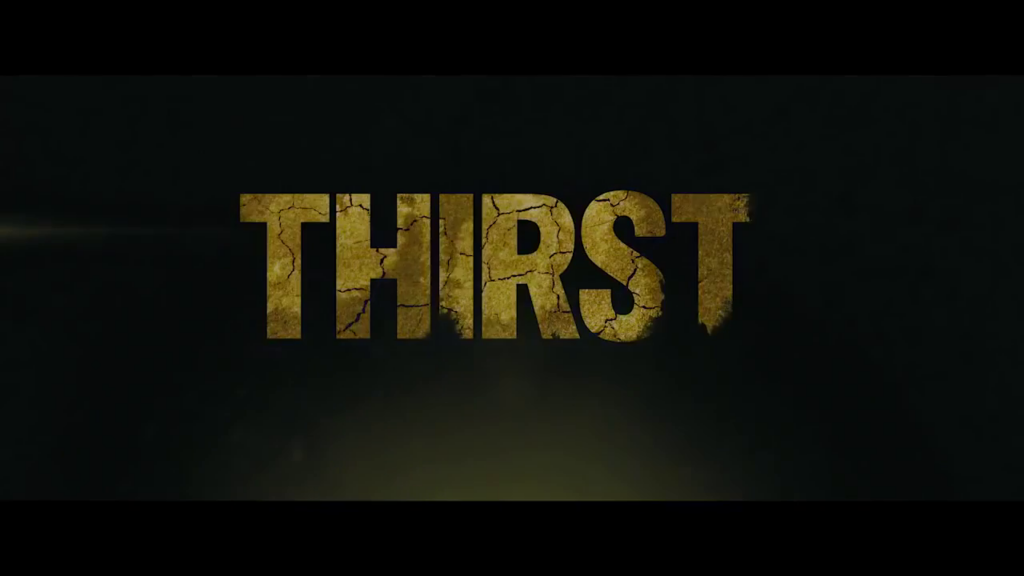
Thirst (2015)
Film review #620
Director: Greg Kiefer
SYNOPSIS: A group of young delinquents are sent into the wilderness to a couple who aim to toughen them up and make them responsible members of society by hiking through the wilderness. Unfortunately, lying in wait is an alien creature that aims to suck them dry, and with no means to contact the outside world, the group must try to survive before they are all hunted down…
THOUGHTS/ANALYSIS: Thirst is a 2015 sci-fi horror film. Opening up like every other horror film, we see an nameless character get murdered after discovering some sort of alien blob…thing. Cut to the film proper, a group of delinquent youths have been sent by their parents or whomever to the middle of the Californian wilderness (i.e. nowhere) to be subjected to a ten-day hike by a couple who run a business of toughening up such youths to make them productive members of society: that’s the story anyway, but it seems very dubious and highly illegal. Anyway, the group eventually stumbles upon an alien that wants to suck people dry (?), and they must find a way to survive and escape. It is, in short, every other creature/monster-based horror movie, with no real surprises or novelties to make it interesting. The plot points are predictable, and a lot of the film is just a lot of shouting and running around the middle of nowhere without being able to generate any real sense of atmosphere or terror. It’s not even hilariously bad, it’s just boring and nonsensical.
The characters are the usual bunch of horror unlikeable stereotypes: they don’t really develop as characters, and their deaths aren’t really impactful. One character in particular does virtually nothing and survives near to the end of the film, and I wonder if someone just forgot to do anything with them. Killing off the two “adult” characters could have been an interesting twist that forced the younger ones to grow up, but it doesn’t really happen. The alien is obviously a Xenomorph rip-off with no attempt to be original. For some reason, it’s also half-metal, which makes no sense. We’re given no sense of what this alien is or how it works, which isn’t too much of a deal insofar as we don’t need to know it’s motivations, but it would be nice to give the alien some substance to make it stand out.
Obviously made on a budget, the film just consists of the cast wandering about in the middle of nowhere as mentioned, and the special effects are unconvincing at best. No jump scares, no atmosphere, no tension, and no originality, Thirst won’t quench the need for a good horror.
-
#619 – District 9 (2009)
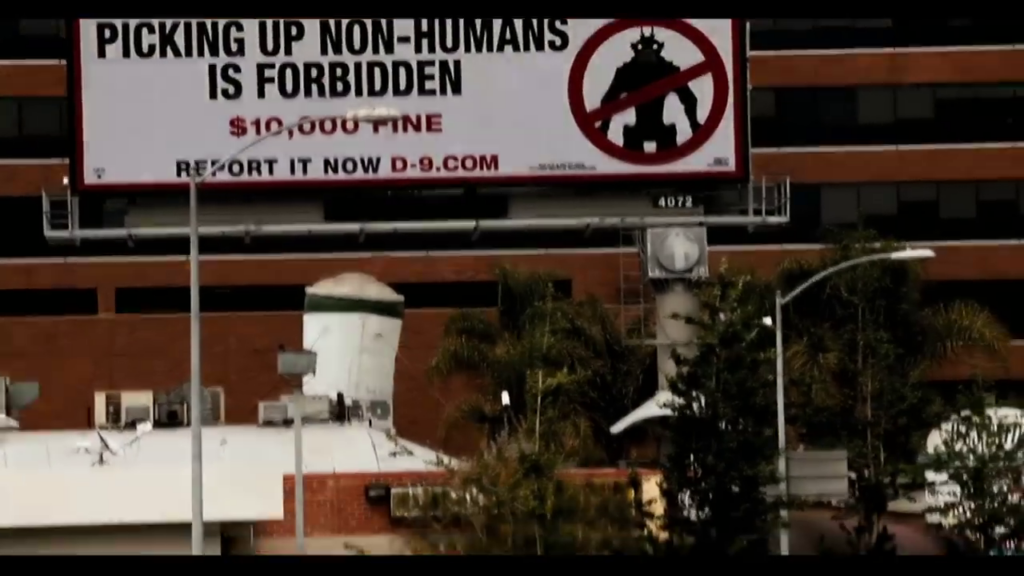
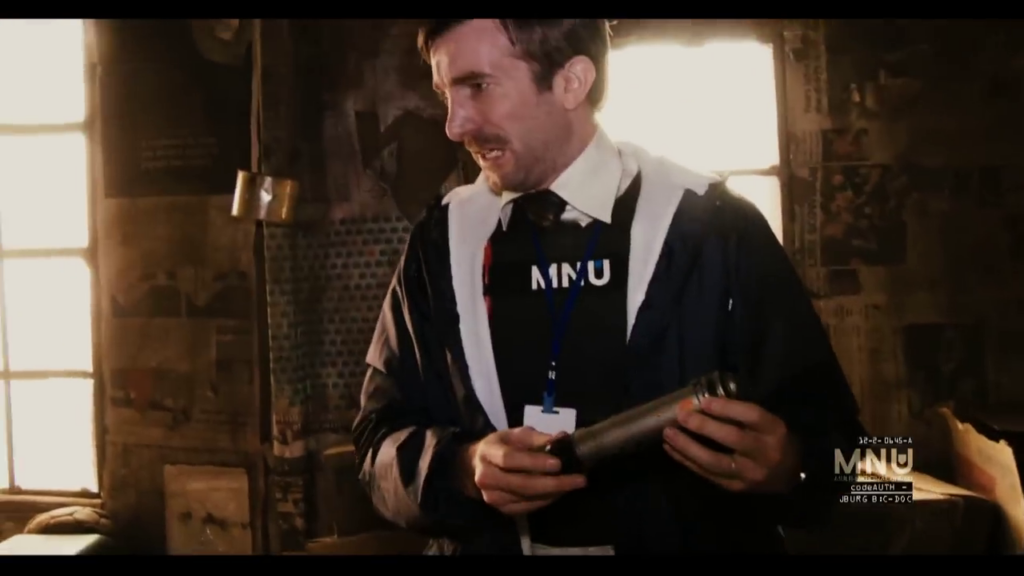
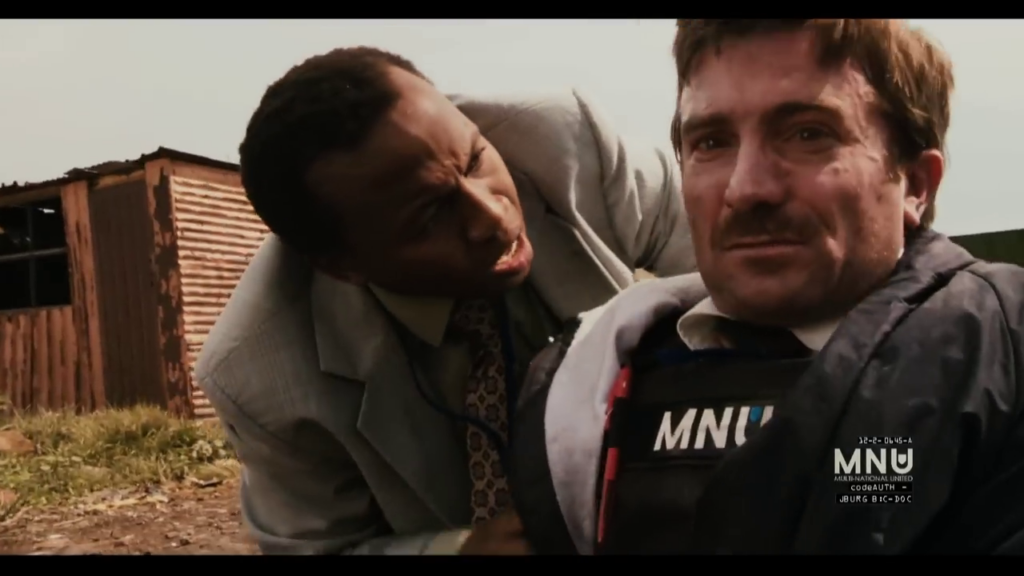
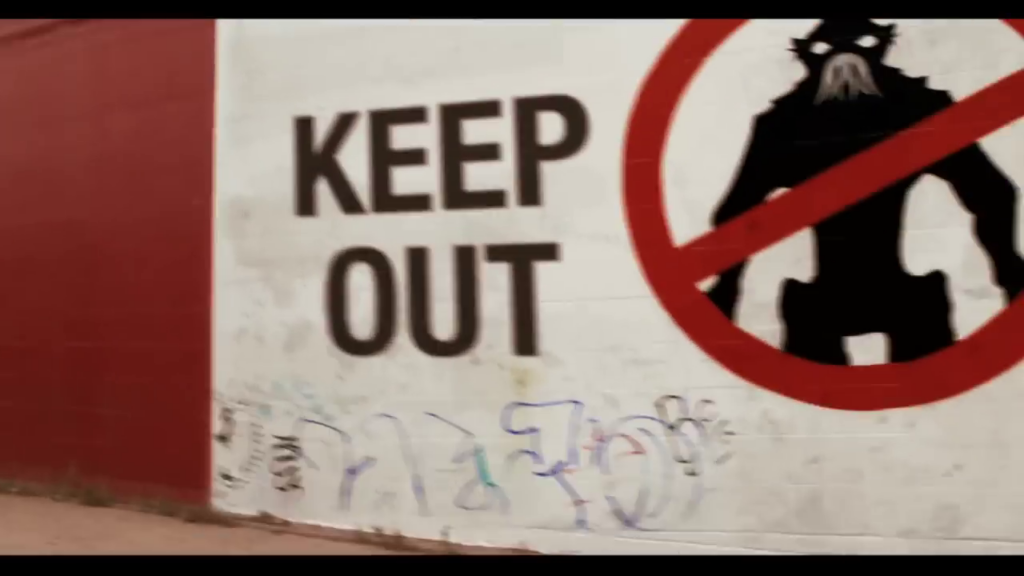
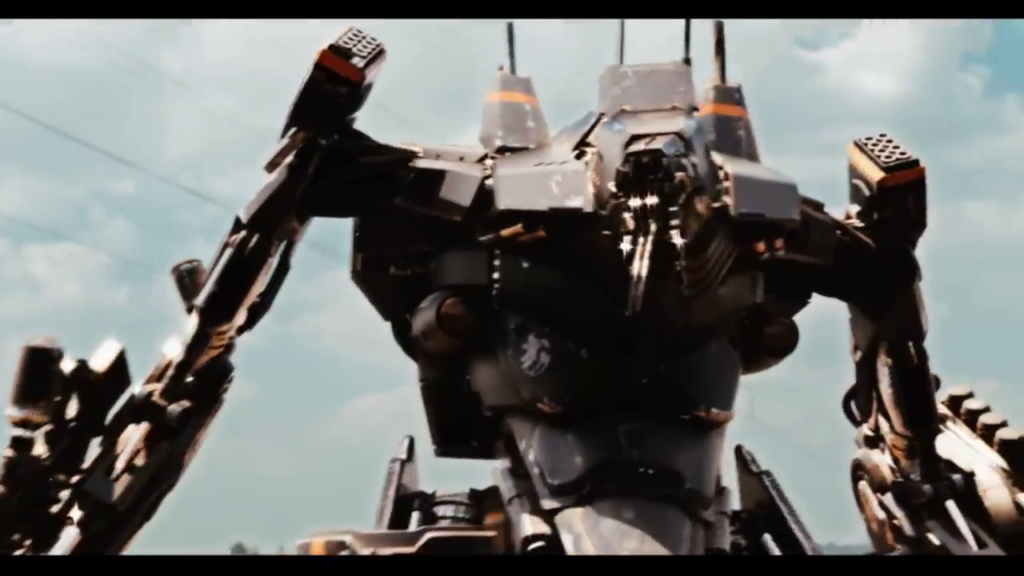
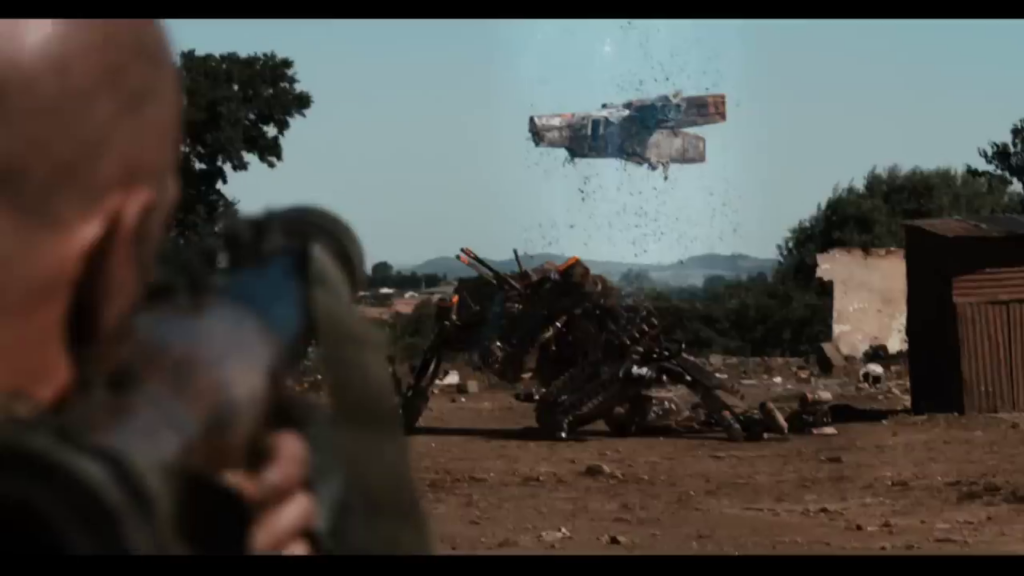
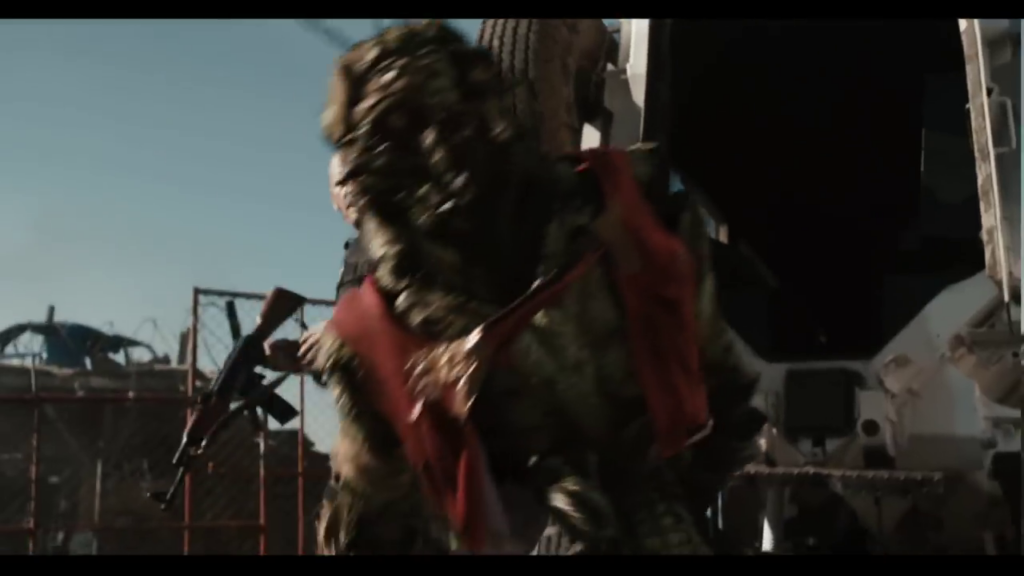
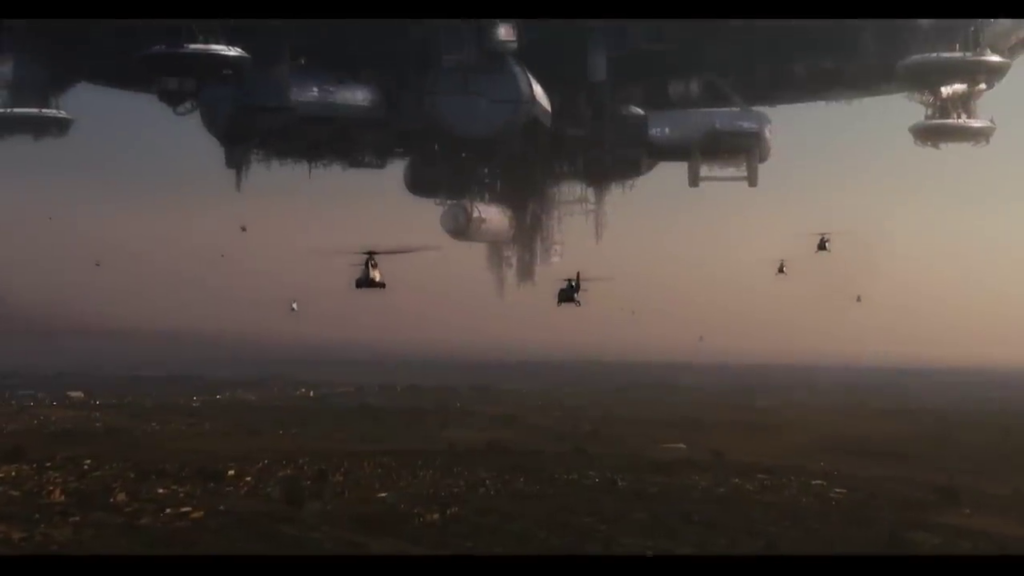
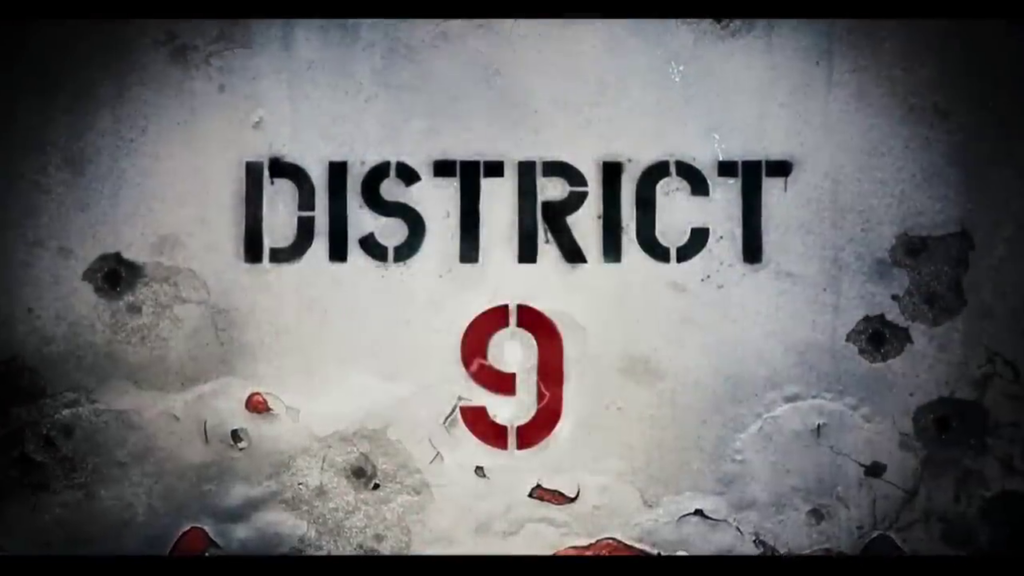
District 9 (2009)
Film review #619
Director: Neill Blomkamp
SYNOPSIS: 28 years after an alien ship arrived on Earth hovering over Johannesburg, the alien inhabitants are confined to a section of the city known as “District 9.” When the decision is made to “relocate them (forcibly) into a new camp outside of the city, Wikus van de Merwe is put in charge of leading the relocation, but when he is exposed to a strange substance, he finds himself slowly turning into one of the aliens, and is confined to be experimented upon. When he escapes, he seeks the only place where no one will look: district 9…
THOUGHTS/ANALYSIS: District 9 is a 2009 sci-fi film. 28 years after a spacecraft arrives to Earth, stopping to hover directly over Johannesburg. The alien inhabitants were cut free and settled in a sealed-off region of the city known as “District 9.” Now, after resentment has grown by humans for the “prawns” living in the city, seeing them as responsible for crime and costly, the government has decided to relocate them to a camp outside of the city, and hired weapons company Multinational united (MNU) to oversee the relocation. The head of the company chooses his son-in-law Wikus van de Merwe to oversee the operation, and they begin the task of delivering notices of eviction to the residents (and relocating them whether they agree or not). Wikus is exposed to a strange substance that slowly turns him into a prawn, which leads to him being contained and used for experiments (particularly in using the alien’s weaponry which only they can use). The film’s method of storytelling and giving the backdrop to the film through reports, interviews and documentary footage is a bit chaotic but it nevertheless gets the background of what is going on well, and makes it interesting without devolving into just plain exposition. Being set in Johannesburg brings us a setting different from the usual settings of films in New York or Los Angeles, and the location obviously brings up echoes of apartheid with the prawns being fenced off from humans. The film doesn’t really lean too much into that though: maybe it’s fine with just the setting being enough to offer an analogue between fiction and reality, but it does feel like it’s something that should be more of a focal point given the setting, but isn’t. There’s an element of satire that pervades over proceedings, which complicates things further, but the film is put together in such a way that you don’t need to understand all the different levels it is operating on.
The film is at it’s best when it offers a raw storytelling, told through all the different types of footage, offering flashes of lore and plot points from all angles that comes together quite nicely. The raw, messiness of the events of the film disrupts a more clean, sterile narrative, and keeps the stakes high. On a negative note, the film does have to fall into very cliché action scenes at points to move things along, which feel very out of place. The scene where Wilke escapes from the lab where he is held makes it seem a bit too easy, given that he was being held under maximum security, he manages to run up some stairs and out into the world with very little issue.
Wilke as a character starts off as a pencil-pusher promoted way beyond his ability, thanks to his Father-in-Law giving him the job (and maybe to take the blame for anything that inevitably goes wrong, the film leaves that open). Wilke seems to have a typical attitude to the alien “prawns,” in that he clearly has a negative view of them. His attitude towards them, interestingly, doesn’t really change much, even when he is turning into one himself, and he relies on them for help: he is always only thinking about himself. He doesn’t really get much of a redemption arc, but he is certainly a victim of humanity, but in a different way to the prawns themselves. It’s murky and not clear-cut but I suppose that’s what makes it stand out in the sci-fi genre. The prawns themselves are quite convincingly portrayed and brought to life, and though we’re not given too much backstory about them, we don’t really need it to understand their motives.
Overall, District 9 offers something original enough in the genre, weaving together complex elements and footage to disrupt a typical narrative and brings its messiness to the forefront of the experience, without alienating the viewer. It’s chaotic and messy, but clearly intentionally so. There are definitely parts where the film has to resort to more typical filming techniques and narrative points to bridge the gaps, but on the whole it offers enough to make it stand out in the genre, and entertaining enough regardless of how far you wish to dive into the satire and the sub-text of the story.
-
#618 – Kin (2018)
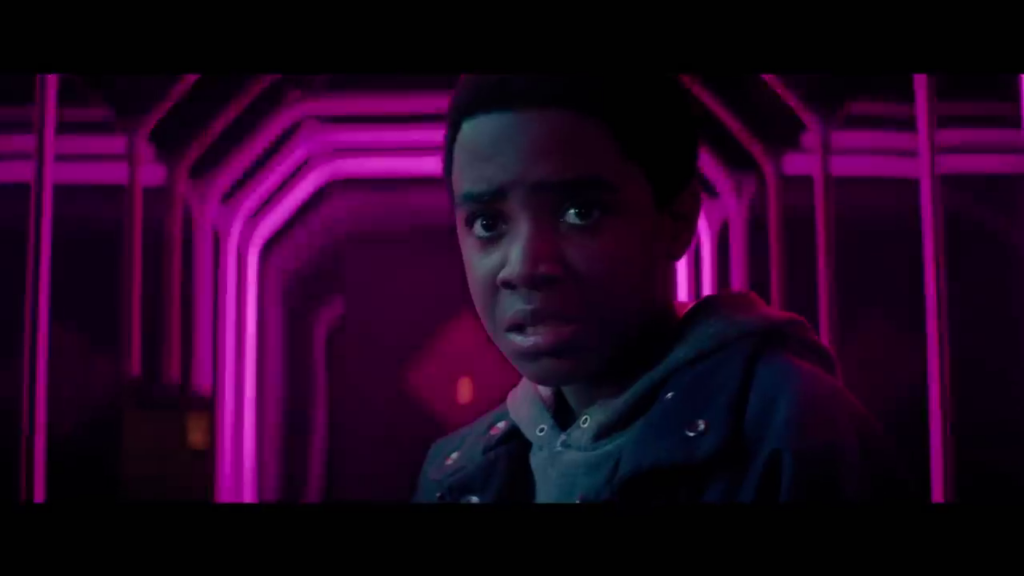
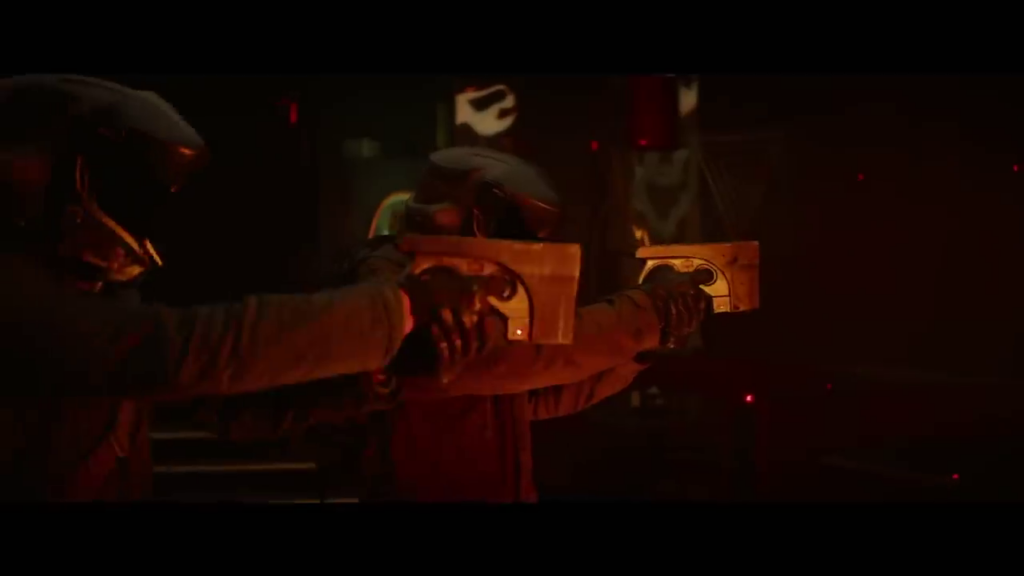
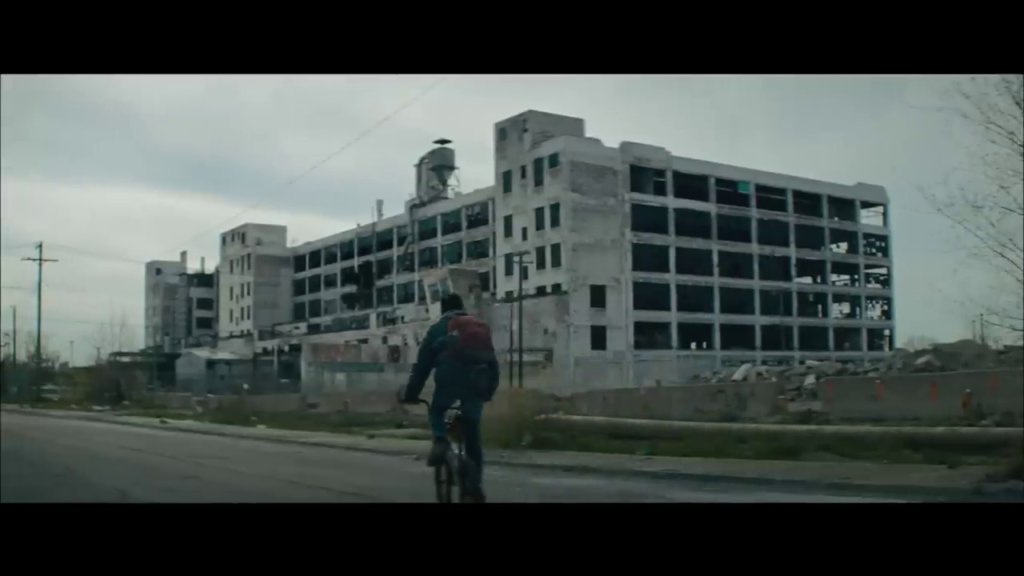
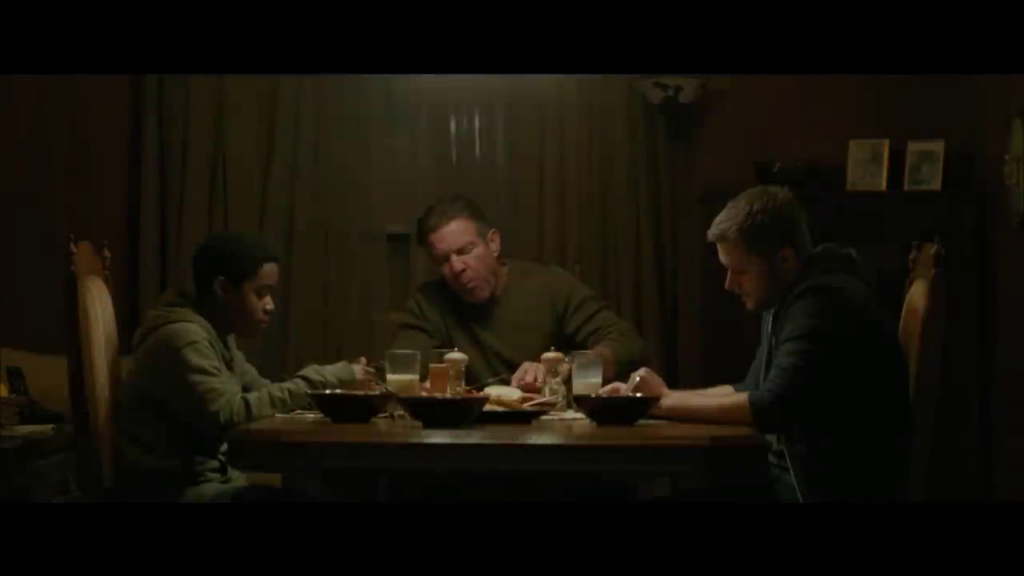
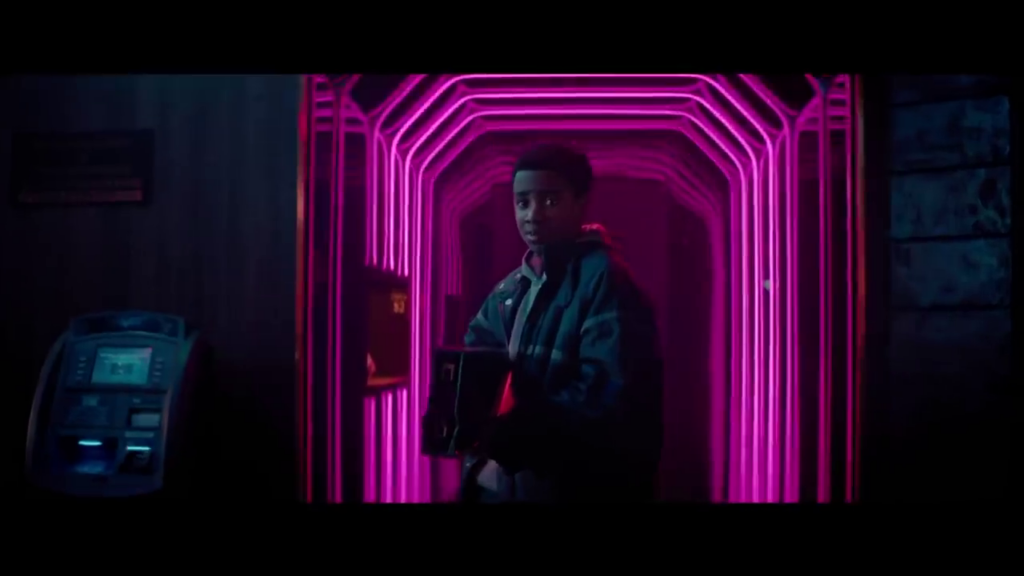
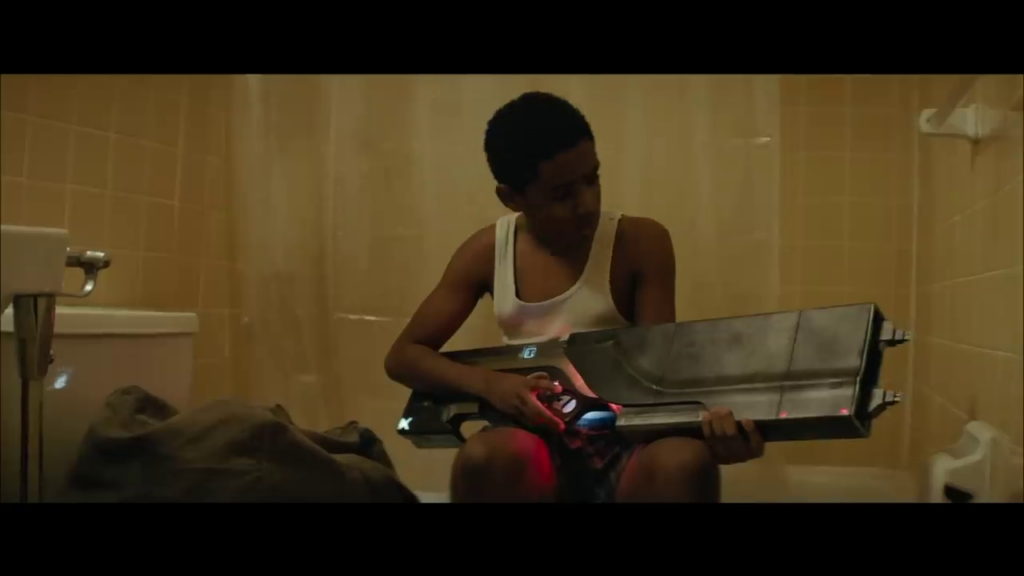


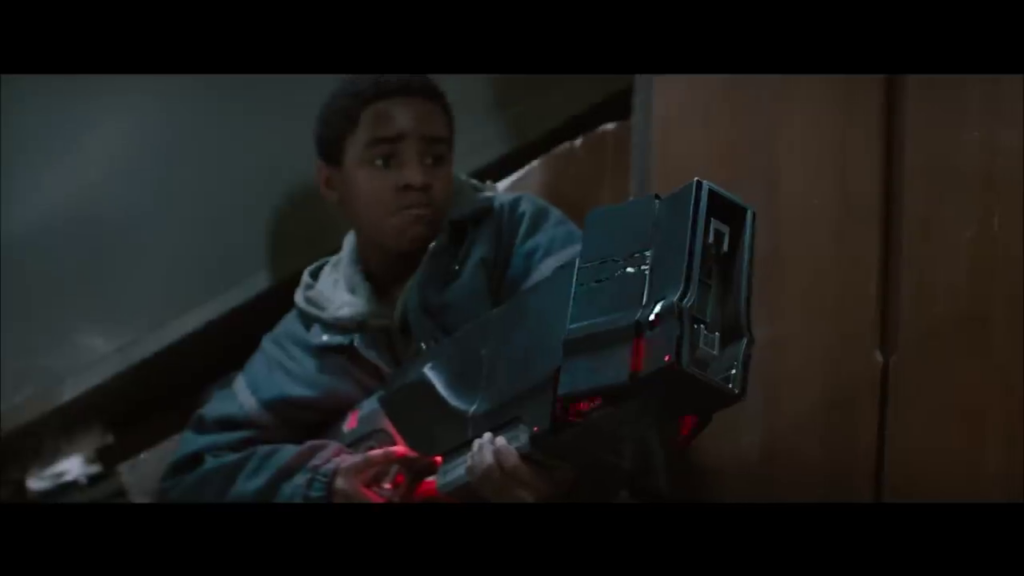
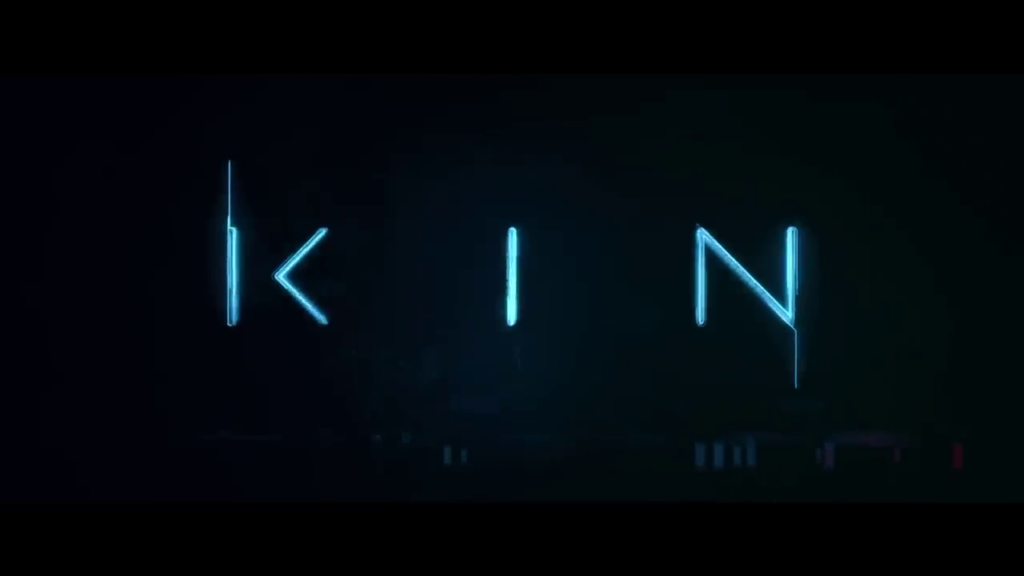
Kin (2018)
Film review #618
Director: Jonathan Baker, Josh Baker
SYNOPSIS: Eli Solinksi is a fourteen-year old boy who is scavenging copper wire to sell from abandoned buildings. One day, he comes across the aftermath of a battle of some sort, and a strange weapon, which activates when he touches it. At home, Eli’s adopted Father informs him that his son Jimmy is returning home after being in jail, and after some trouble, Jimmy decides to take Eli on a road trip, not telling him that their Father is dead and a criminal gang is hot on their tail…
THOUGHTS/ANALYSIS: Kin is a 2018 sci-fi film. The story centres around Eli, a fourteen-year old boy who lives with his adopted Father. He is scavenging abandoned buildings for copper wire when he comes across the aftermath of a battle, and a strange weapon that activates when he touches it. Meanwhile at home, his Father’s son Jimmy is released from prison, and, owing money to a local gang for protection, ends up robbing his Father’s safe. Catching them in the act, their Father is killed alongside the gang leader’s brother, and so Jimmy takes Eli on a road trip to escape from them, not telling Eli what has happened to their Dad. There’s a lot to take in there; the film is a sci-fi, family drama, road trip film all rolled into one. Perhaps expectedly, the film has troubles balancing all of these different elements. The core part of the story is this family drama and the bond between Jimmy and Eli, with it developing through this road trip. The problem with this is that the film seems to have picked the most mundane element to be the focus, and leans heavily on very typical tropes for that genre. For example, that Jimmy doesn’t tell Eli that their Father is dead, and keeps trying to tell him before being interrupted, leaving Eli to eventually find out through a TV report, is just so incredibly cliché it ruins any sense of personal character development. Another issue with this is that the film scuppers any relationship between the two main characters by having their bonding through montages, which don’t really give the characters space to interact beyond the generic stuff.
Another issue I had was that the characters don’t really deliver emotional performances. I don’t think this is fault on part of the actors; for some reason, none of the characters get really angry, or upset or anything, and what should be the most emotional scenes fall flat for this reason. Also, Eli kills a lot of people, and its never once addressed, or the consequences wrestled with. The film’s strong points are its action scenes, and the sci-fi element promises some mystery and a unique twist, but it’s mostly forgotten about until the end when someone turns up to just explain everything away. There’s some good things in here, but Kin tries to do too much, and puts its emphasis in the wrong places. This leads to the film ultimately falling back on well worn tropes that further erode the ability to develop it’s core characters and their relationship. Not terrible, but it’s flaws are plain to see.
-
#617 – Invisible Mom (1996)
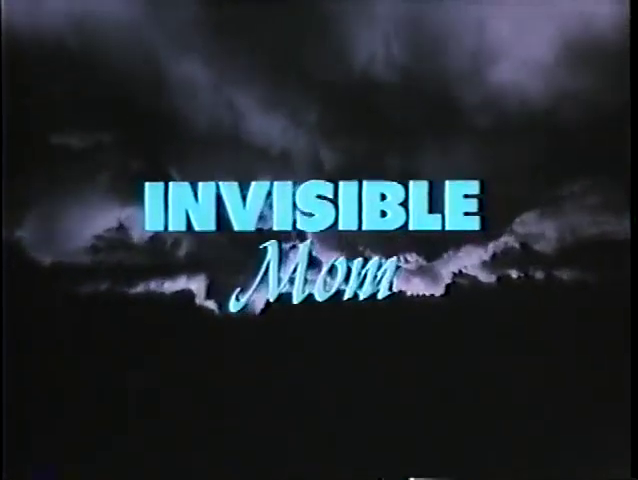
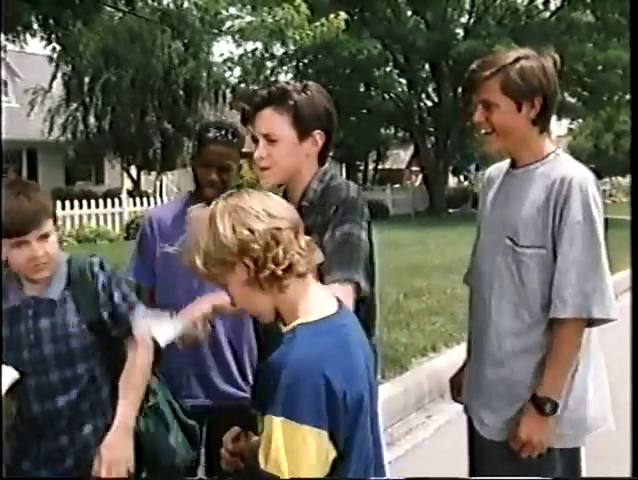
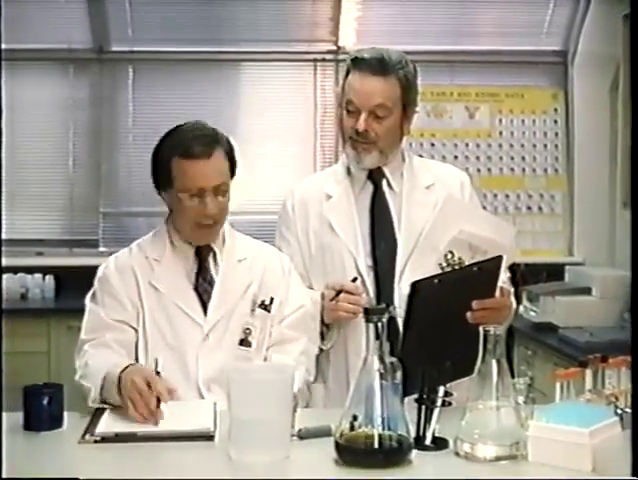
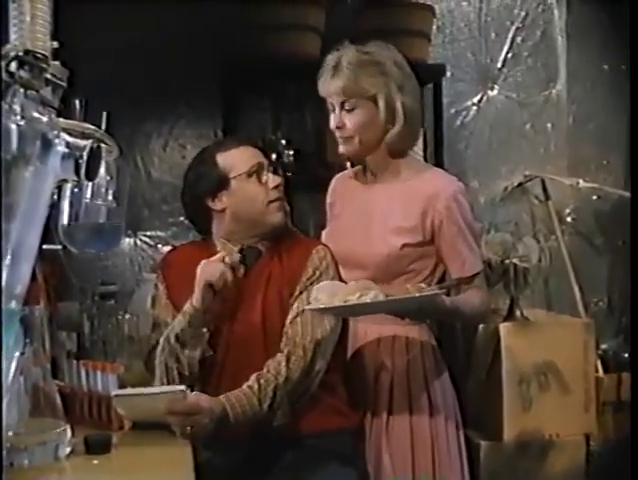
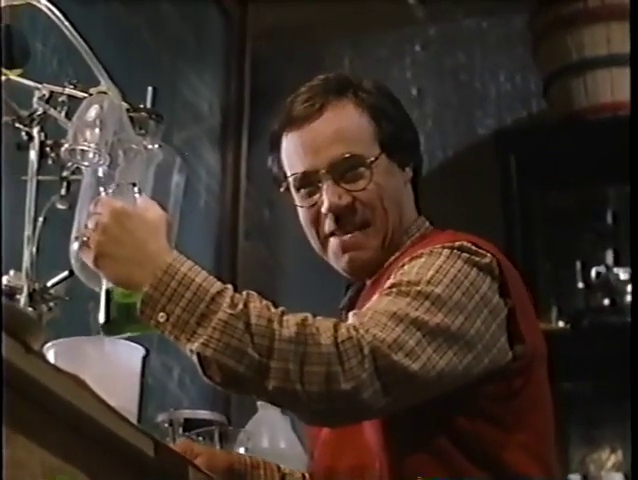
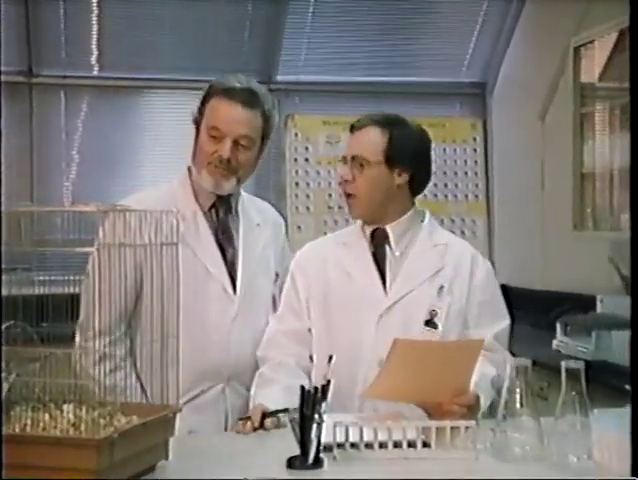
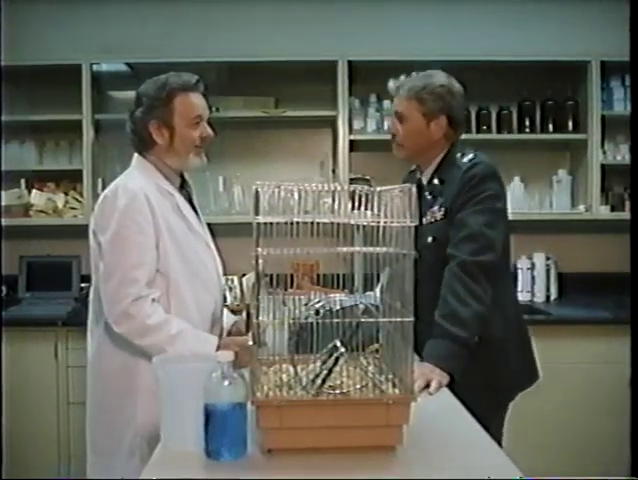


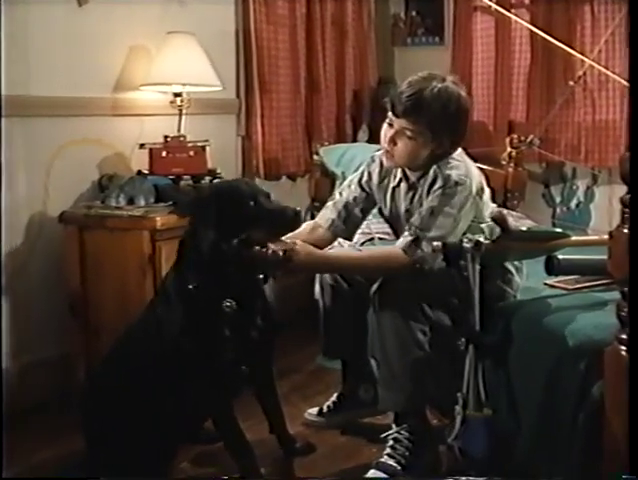
Invisible Mom (1996)
Film review #617
Director: Fred Olen Ray
SYNOPSIS: Scientist Karl Griffin invents a formula that turns people invisible when they drink it. When his wife drinks it by accident, she turns invisible, and without an antidote, can’t turn back. When Karl’s supervisor learns of the discovery, he tries to take the invention and credit for himself, and Karl must find a way to turn his wife visible again…
THOUGHTS/ANALYSIS: Invisible Mom is a 1996 sci-fi film. The plot revolves around Josh Griffin, a kid whose father, Karl is a scientist who is always inventing things. When he invents an invisibility potion that his wife accidentally drinks, she is stuck invisible because Karl is yet to find an antidote. Karl’s invention is stolen by his supervisor, who wants to take the credit for it, and Karl is arrested, meaning that it is up to Invisible Mom to try and save the day. There’s very little else going on in the film: it’s a family-friendly feature with low stakes and minimal danger. The consequences of Josh’s Mom turning invisible include the very usual consequences, including getting back at the bully kid who is picking on Josh, and it’s all very safe and predictable stuff.
In a surprise to no one, this is a very low budget film with not much going for it: having invisible characters probably helps with the cost too. The acting is…fine for what the film is, as no one has to do anything really difficult or extravagant. The characters are very cookie-cutter and are instantly forgettable, engaging in a very unoriginal plot that only very young children might be entertained by. There’s not much else to review in this film: Invisible Mom is a predictable children’s film that makes little to no effort to have fun with with the concept, whether this is due to a lack of imagination in the writing, or a lack of budget to actually do anything other than have people stand around talking. A film about invisibility you’re better off not seeing.
-
#616 – D-Railed (2019)
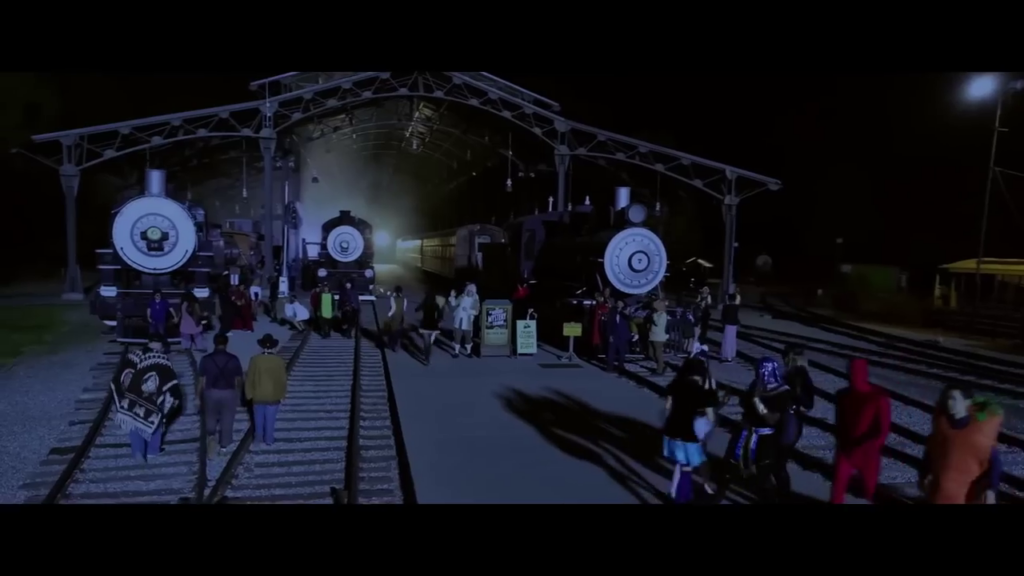
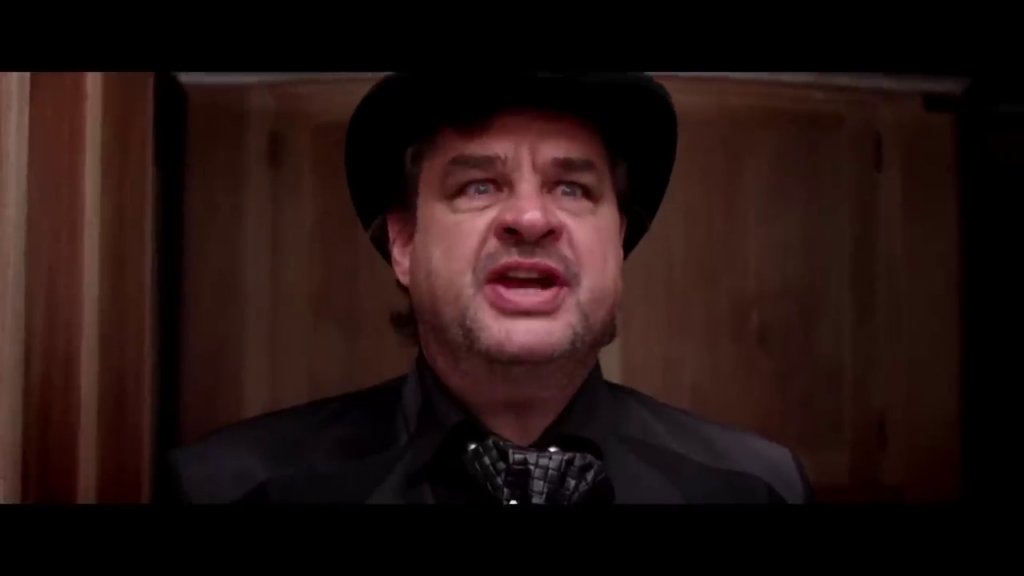
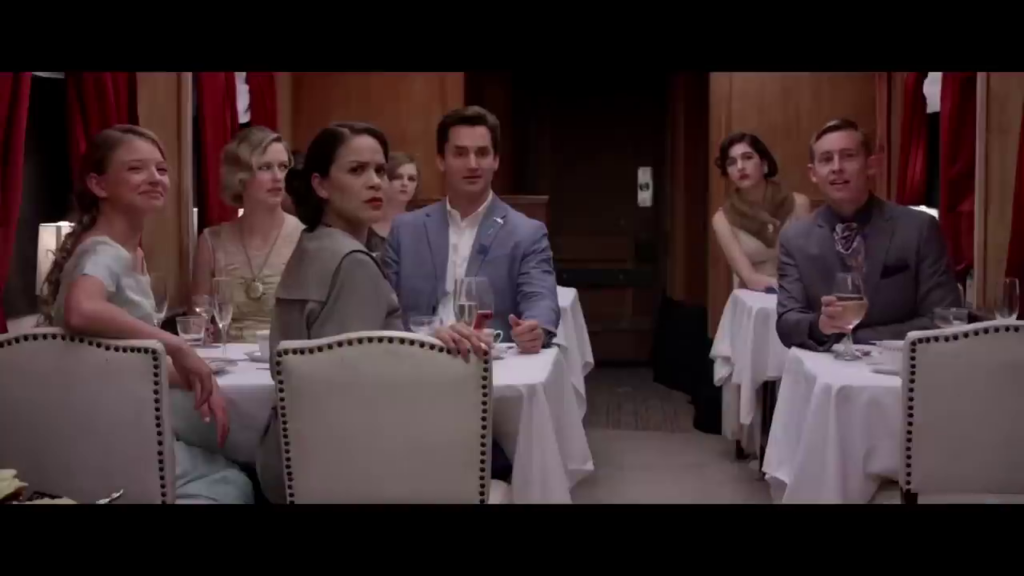
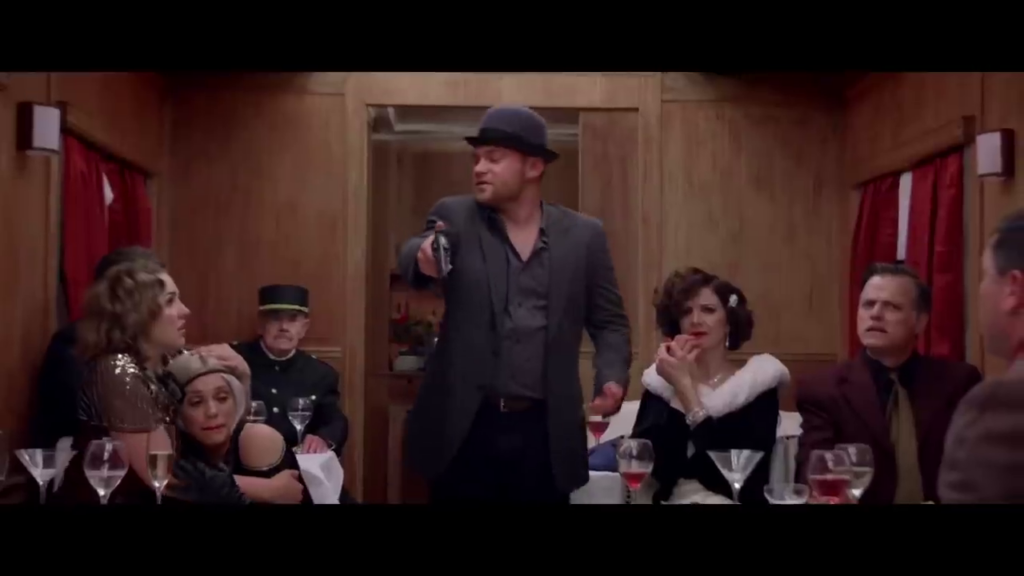
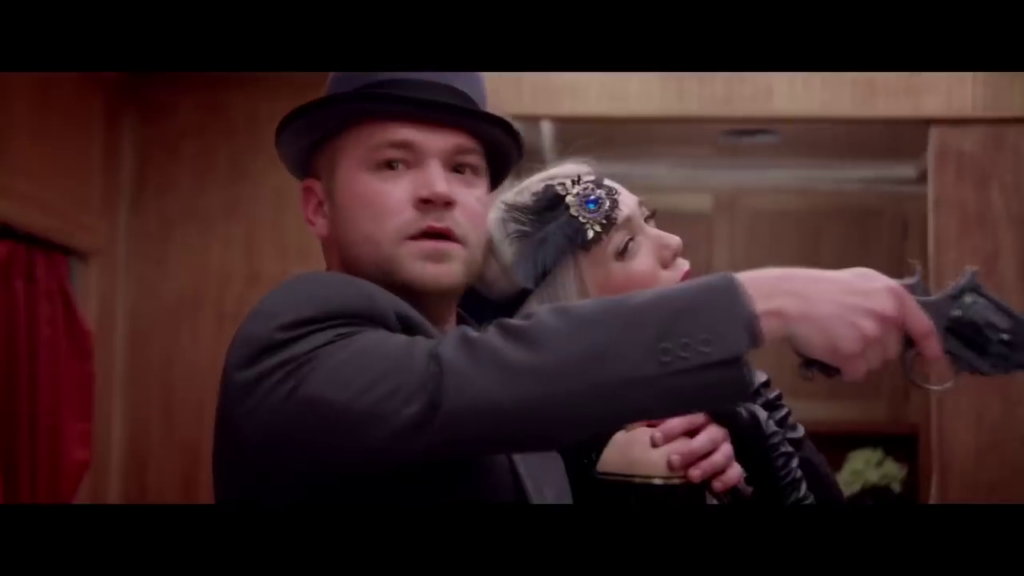
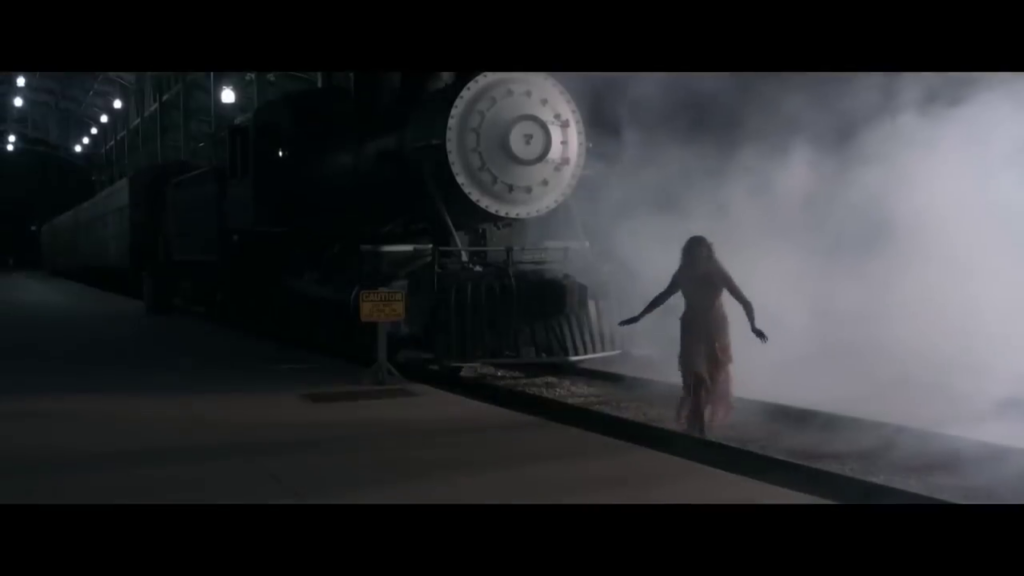
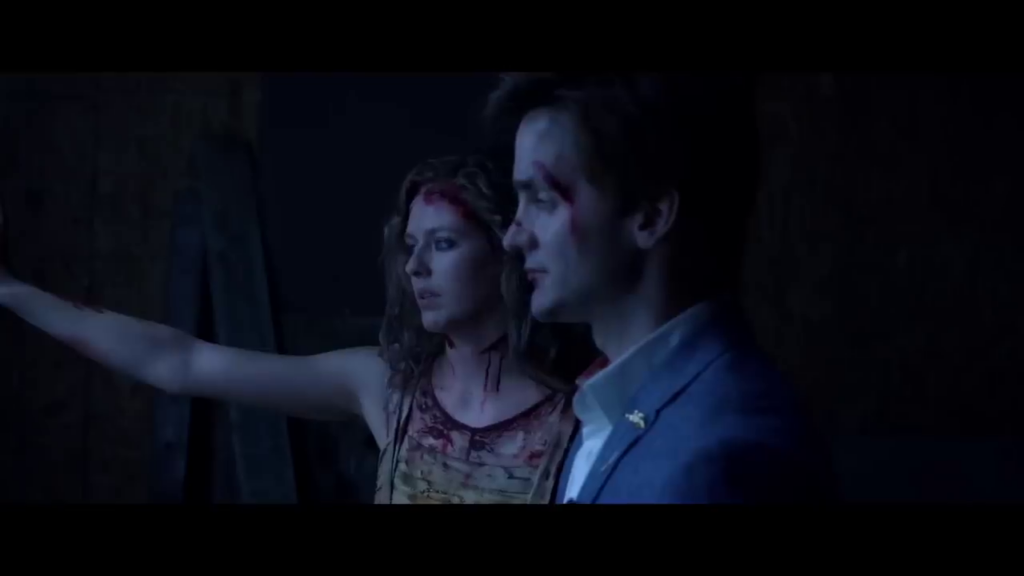
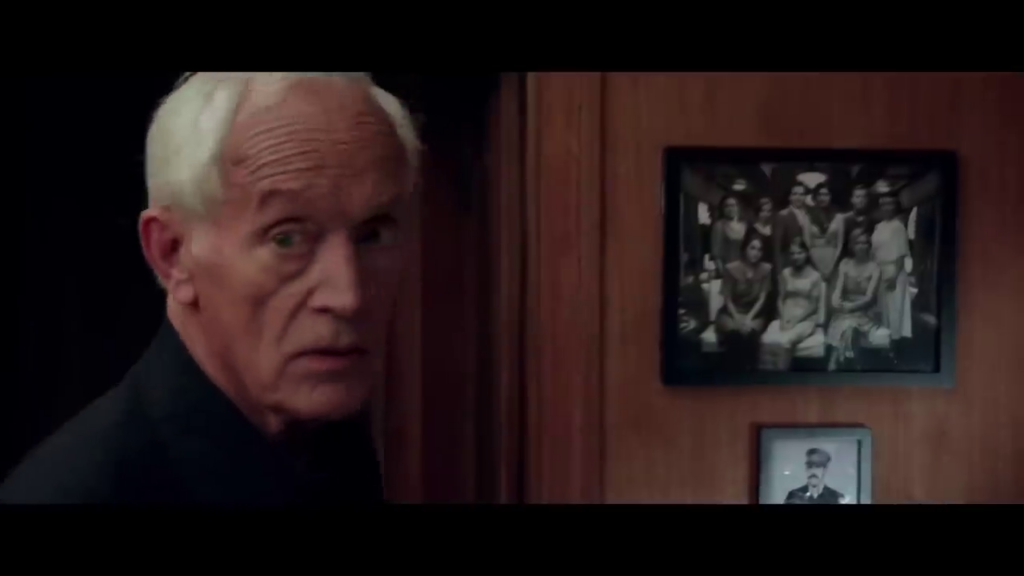
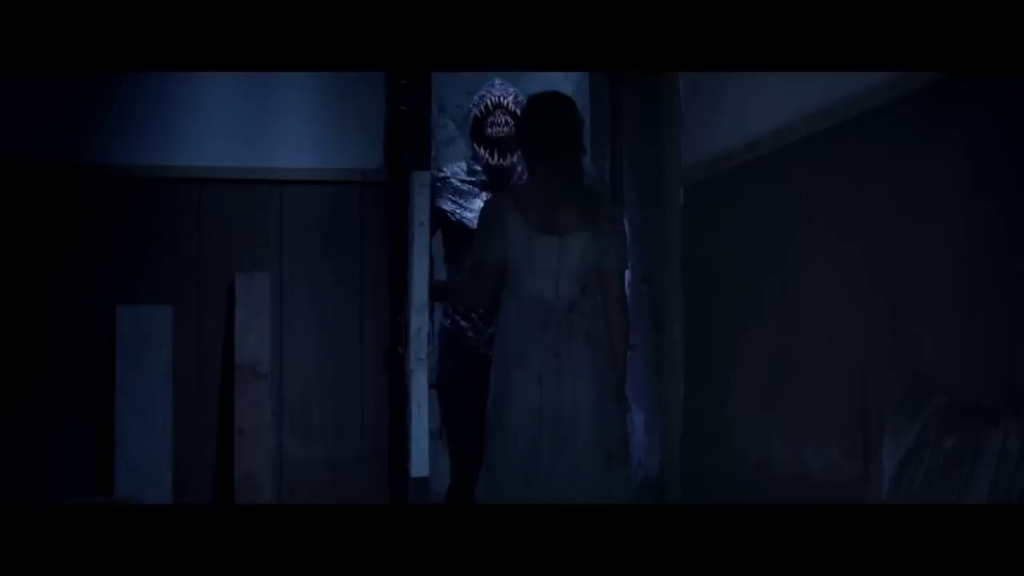
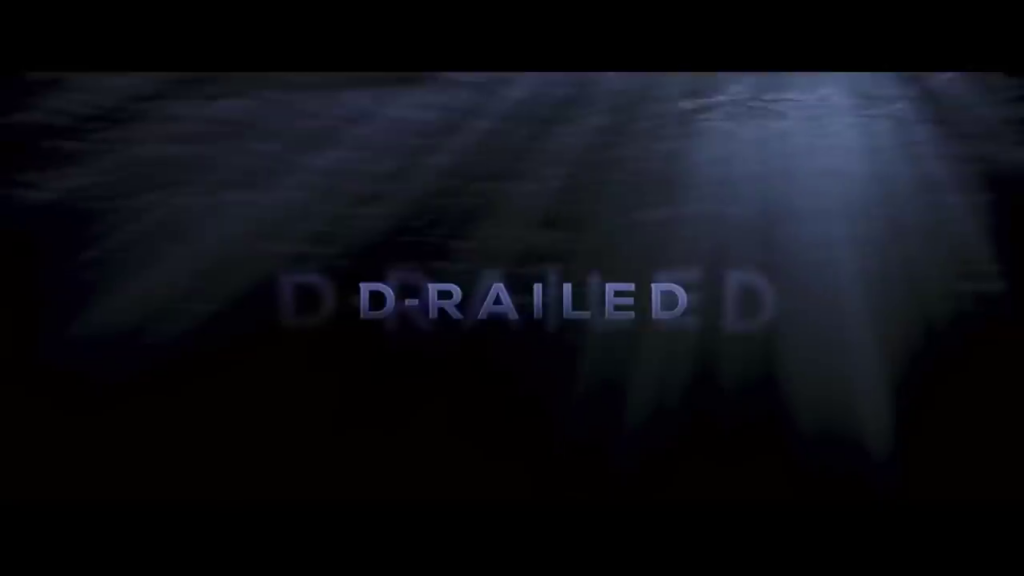
D-Railed (2019)
Film review #616
Director: Dale Fabrigar
SYNOPSIS: A murder mystery event takes place on board the train, and the guests find themselves caught up in a robbery, as what is real and what is performance starts to be called into question. The train derails into a lake, where a sinister monster is waiting in the waters ready to pick the survivors off…
THOUGHTS/ANALYSIS: D-Railed is a 2019 horror film. Starting off with a murder mystery event being held on a train, the participants get on board and are introduced to the event, and from there, things quickly spiral out of control, as a robbery takes place aboard the train, and the line between what is real and what is part of the event quickly blurs. Honestly, or a low budget affair, the opening act is pretty interesting: the question of what is part of the act and what is real becomes impossible to discern as the action moves pretty fast. Perhaps the characters could have questioned what was real and what was not a bit more, as they just suddenly swap from one to the other, but as viewers, it certainly has a least some intrigue that pulls you in.
Eventually, the train derails and lands in a lake, where a monster starts picking off the survivors. This is where the film itself starts to literally derail as well: the whole blurring of what’s real and what is dropped, and instead we just get a monster coming out of nowhere that starts picking people off quickly, with no real time to make the deaths meaningful. The monster itself is not established in any significant way: there’s no deep lore, mythos, origins, or reason for it to exist, so it doesn’t have much presence as a character. The film’s premise (based on the trailer anyway) is that the characters are trapped on a railway carriage in the middle of a lake as a monster lurks below the water. However, this forms the basis for about ten minutes of the film, as it feels like it quickly runs out of ideas of what to do on a railway. They also rather quickly establish that the shoreline isn’t too far away, so it makes it much less of an issue when they can just swim to the shore.
The survivors make their way to an abandoned house or something, where they’re all picked off by the monster until one remains, who manages to escape back to railway station where the train departed, asking one of the attendees for help. However, in the final twist, it turns out (spoiler) that the murder mystery event actually took place one hundred years ago, and there were no survivors, so the attendee saw a…ghost or something? Here’s the main problem with this film: absolutely nothing is explained or justified. We don’t know anything about the monster, the survivor, anything. In some films you can leave things up to interpretation, but this is not one of them. It explains that the murder mystery event actually took place one hundred years ago and…just stops, expecting us to be satisfied with that. There is no payoff to sitting through this jumbled mess of a film.
The sets are clearly all constructed from plywood, and the monster design isn’t really that convincing. CG effects too are lacklustre, and all this jus adds up to a jumbled mess of a film. I stand by that the premise of the opening act is at least intriguing, and handled well in terms of pace and editing, but the film quite literally derails when the train itself does, rushing too quickly ahead and burning itself out before trying to tie everything together at the end with a barebones explanation that goes nowhere far enough to justify the viewing. Train wreck.
-
#615 – Flashback (2020)
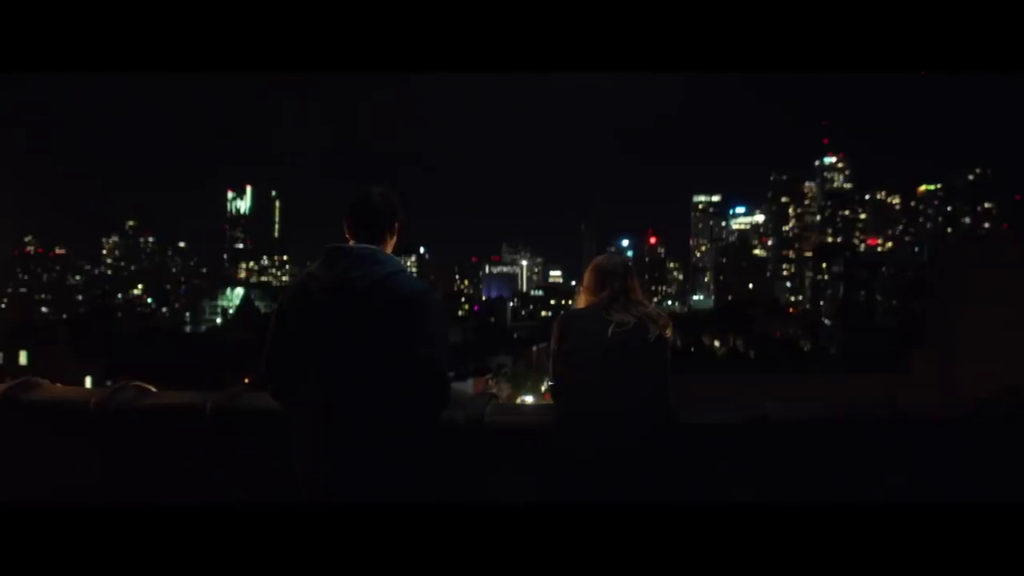
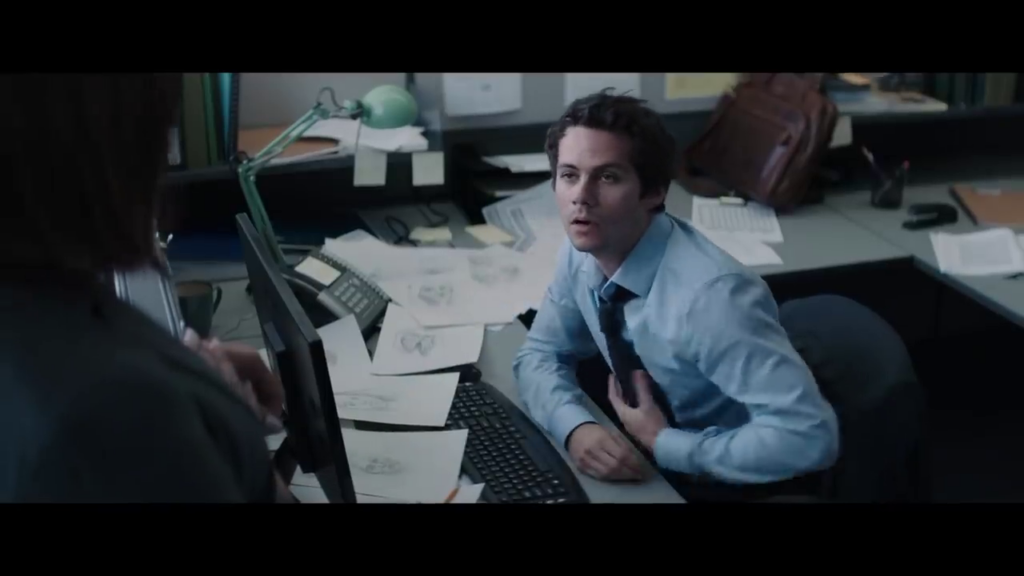
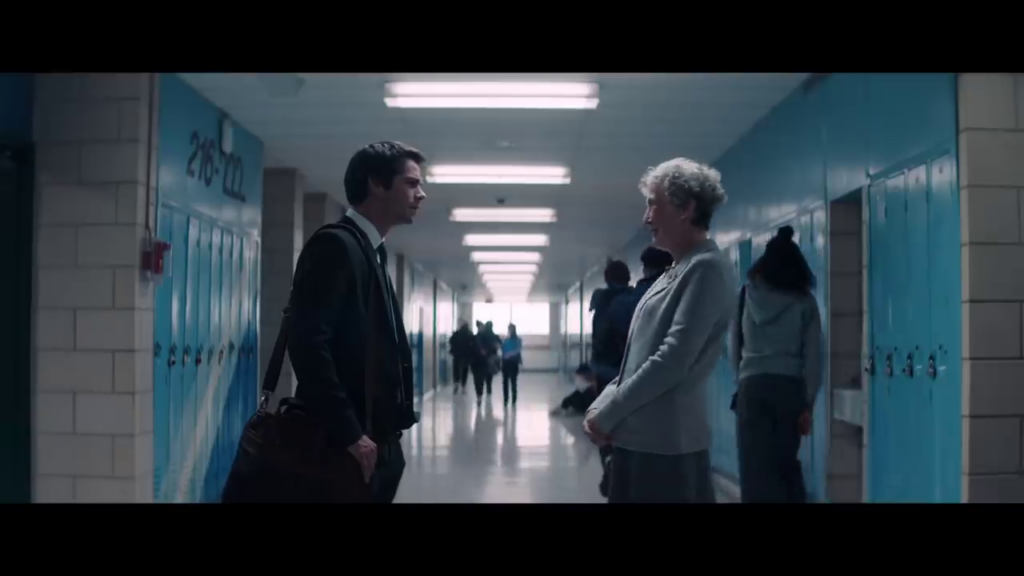
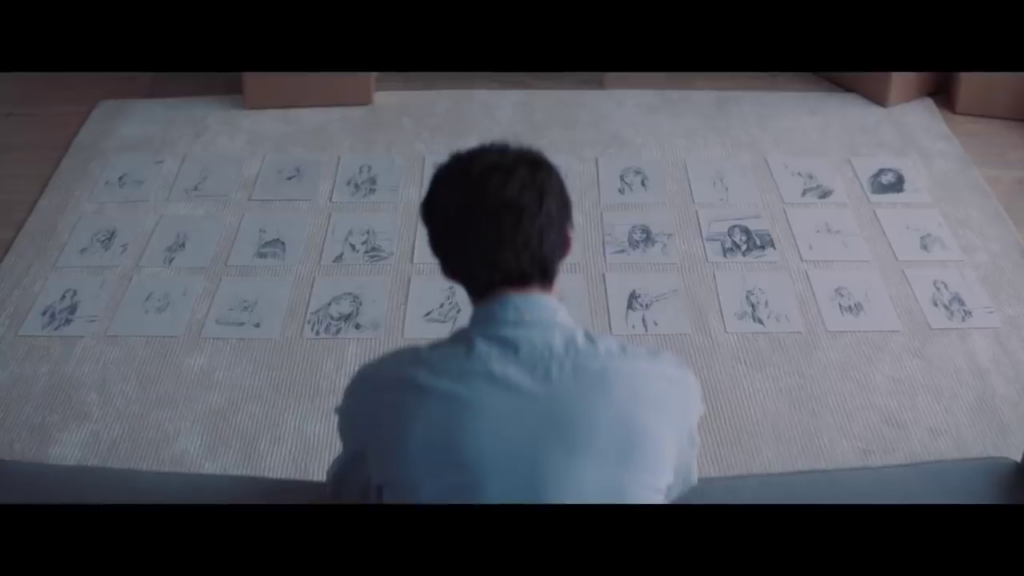
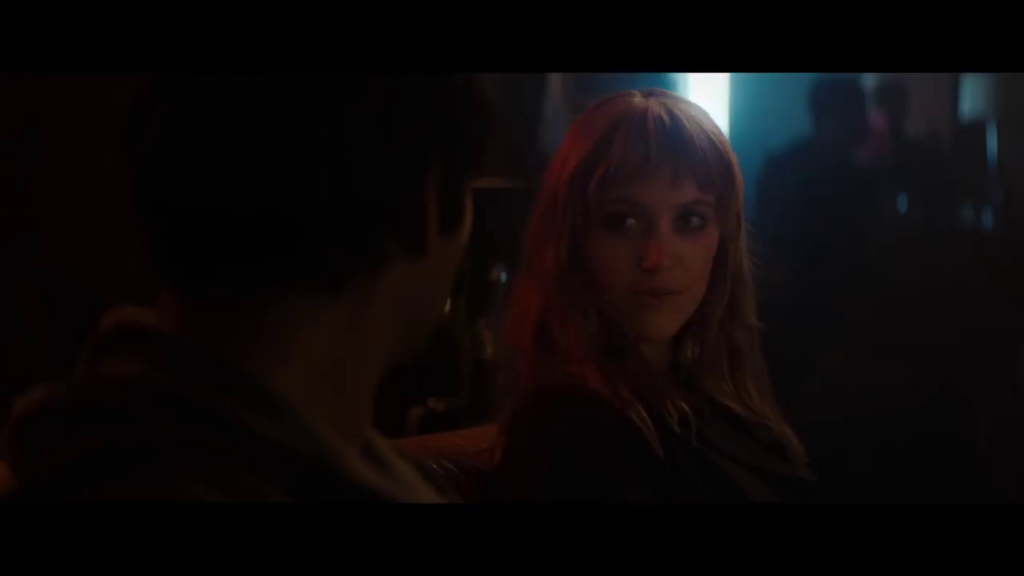
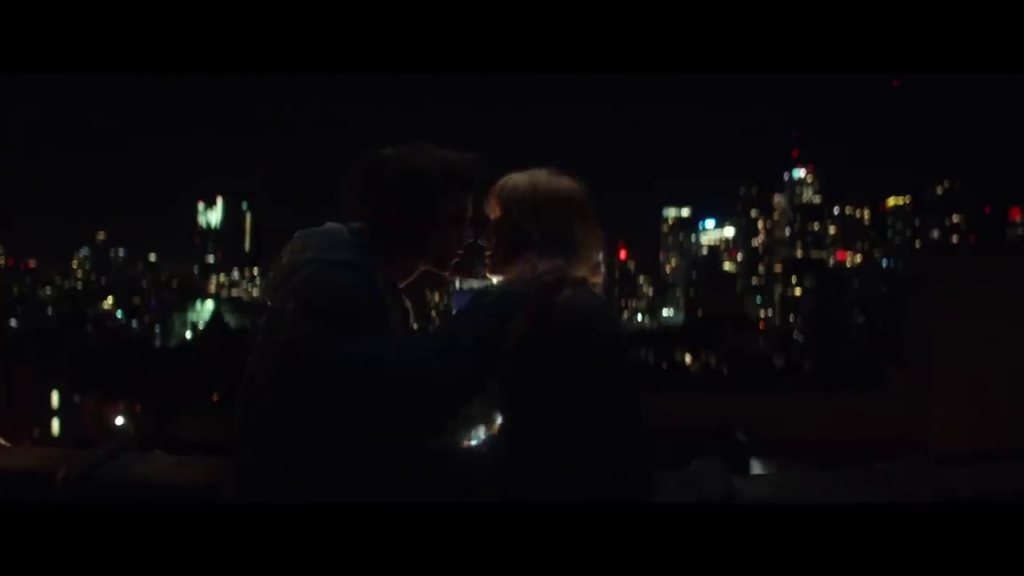
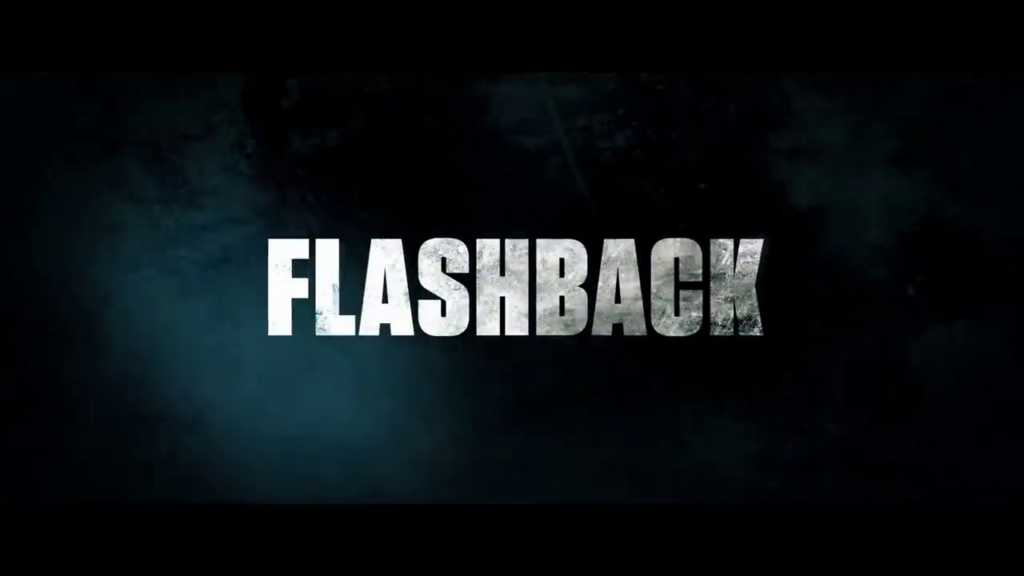
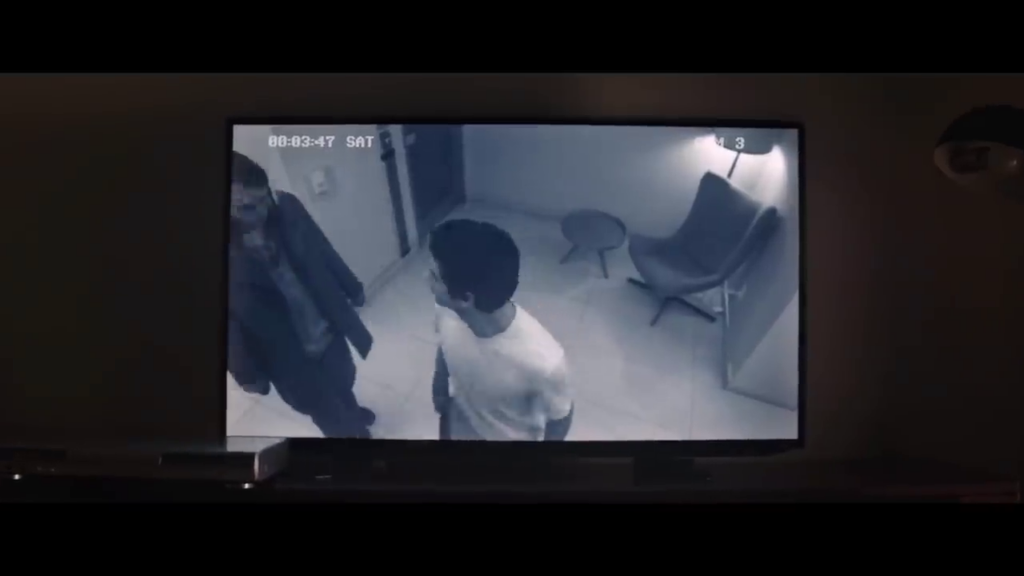
Flashback (2020)
Film review #615
Director: Christopher MacBride
SYNOPSIS: Fred visits his dying Mother in hospital, and begins to get flashbacks about a girl in high school who mysteriously went missing. As he becomes obsessed with trying to find her and get answers, his past, present and future all start to blend into one, as Fred has to make a choice about his life…
THOUGHTS/ANALYSIS: Flashback is a 2020 film. The film revolves around Fred, who lives a fairly normal life with his wife, and typical office job. After visiting his Mother in hospital, Fred starts to have flashbacks about a girl named Cindy, who went missing during his high school days. As his flashbacks become more vivid, and his obsession with finding out what happened to Cindy grows, his sense of reality begins to be called into question, as his past, present, future, and their inherent possibilities begin to overlap and be called into question. Flashback is clearly taking inspiration from films such as Donnie Darko, in which the troubled lead either slowly loses his grasp on reality, or is actually getting closer to the truth, depending on how you interpret it. A complex narrative weaves its way through the story that, honestly, I thought was a complete mess. The film goes overboard with its ideas and pushes the questioning of reality to the point where nothing really matters. Trying to hinge everything around the character of Cindy doesn’t really help things either. Whether Fred’s experiences were all just a bad drug trip, aliens that are forcing humans to experience time linearly when they shouldn’t, or just some sort of breakdown at dealing with the death of his Mother, I honestly felt the film didn’t offer enough for a viewer to draw their own conclusions. Maybe it’s a film that requires multiple viewings to really grasp, but it isn’t compelling enough to make me feel like I would ever want to watch it again.
Fred is a fairly normal, uninteresting character: he has a wife, job and all the normal stuff, and I suppose that’s why him being drawn into this bizarre situation is supposed to be more significant. However, I feel giving him a personality or something interesting about him, a personal connection etc. would have made what happens to him more interesting. Given that his past, present, and future are all blended into one, along with the various possibilities that they can take, you get the sense that nothing matters if everything is possible. You could probably make the film work around that, but again, it just doesn’t. It’s like if you took Everything, Everywhere, All at Once, and sucked all the fun out of it. The supporting characters are again fairly uninteresting, and only really exist as comparisons for how far Fred is or isn’t connected to reality.
There are moments where the film does get it right, the ending has an emotional impact, but these aren’t enough to bring the film together. The ending where Fred decides he “can’t follow” Cindy and falls back to his normal linear life is an odd one that doesn’t really feel justified, and makes the whole experience feels pointless. Maybe it’s a message of accepting what you have in the face of all the other possibilities, but this doesn’t feel earned. Overall, Flashback does it’s best as a mid-sized film, but a sense of overambition and inability to engage or entertain in the face of it’s overwhelming possibilities leaves it mostly dull and without consequence, and overshadowed by the films it is clearly inspired by (Donnie Darko, Matrix etc.). Maybe someone can appreciate it, and they apparently do, given that the film’s scores and reviews are not completely awful, but it’s definitely not for me.
-
#614 – Star Slammer (1986)

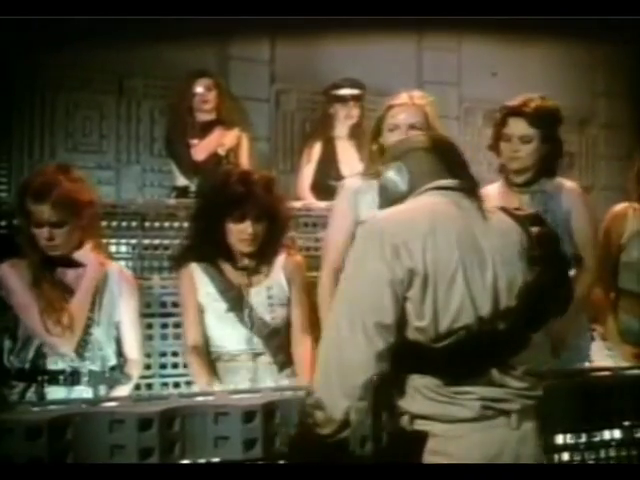
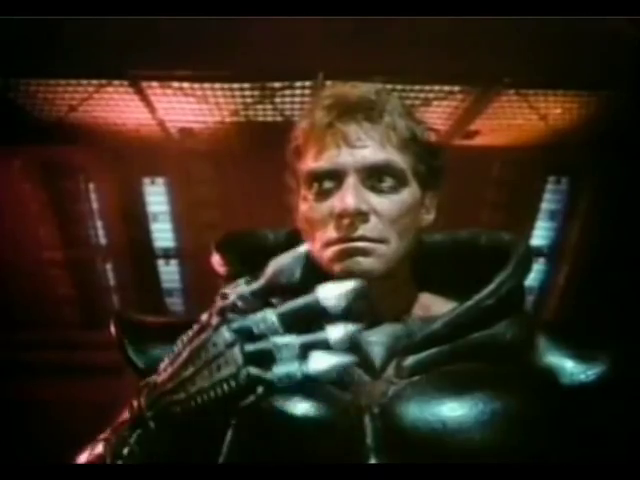
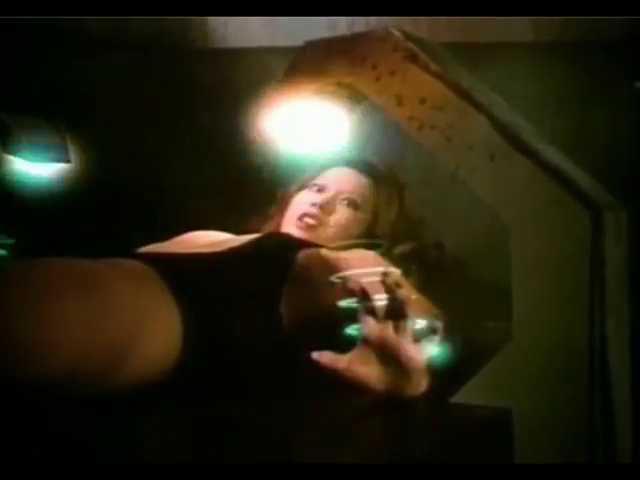
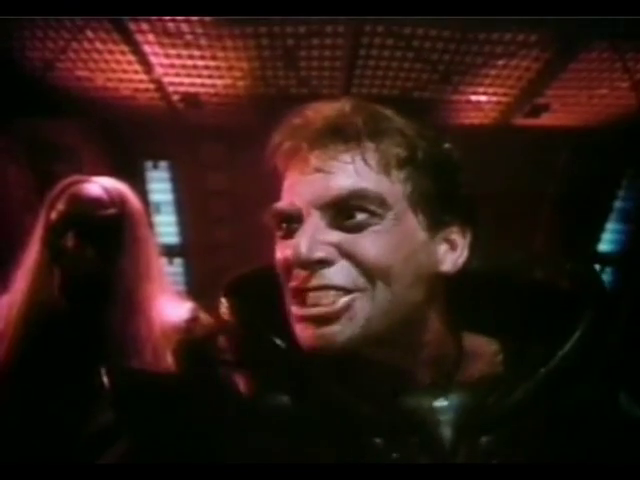
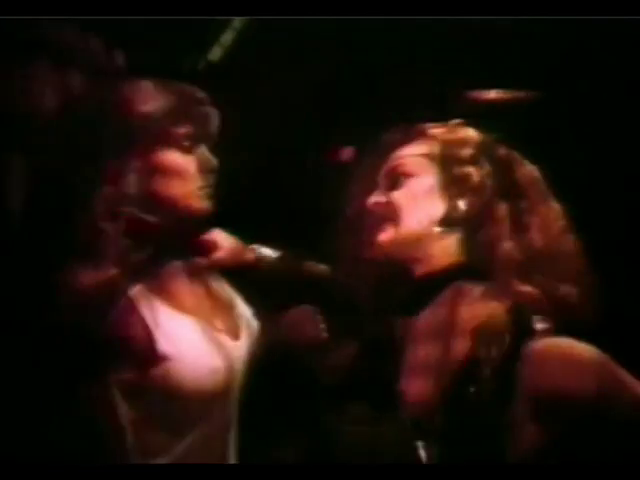
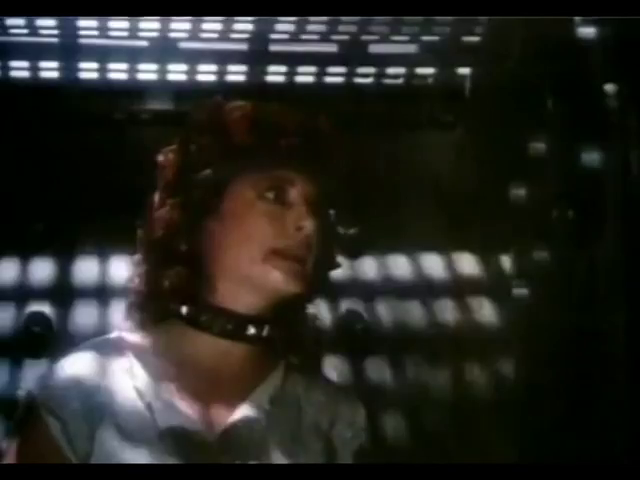
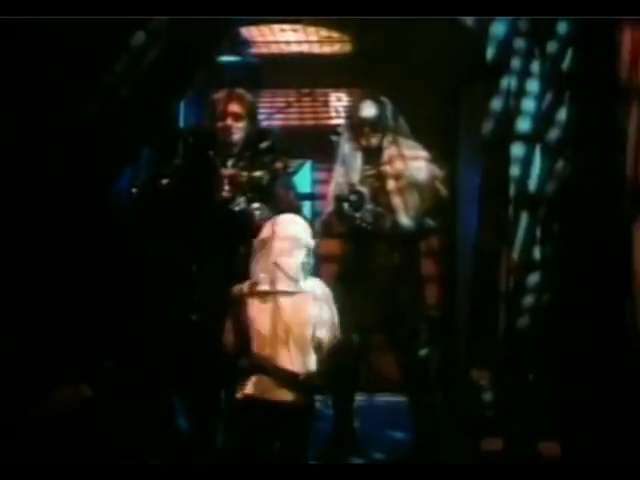
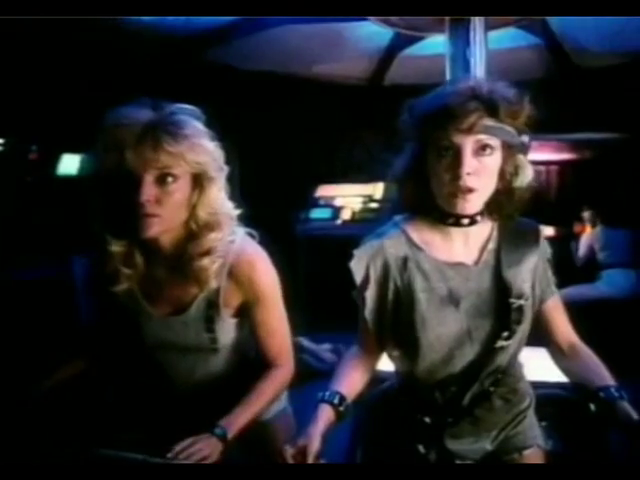
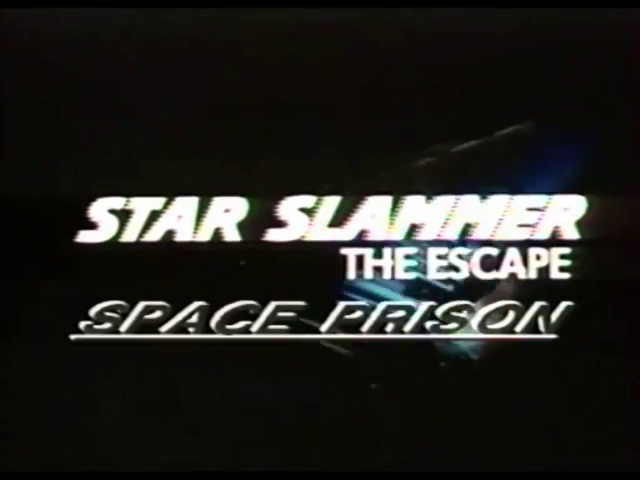
Star Slammer (1986)
Film review #614
Director: Fred Olen Ray
SYNOPSIS: Taura, a freelance miner working on the planet Arous, is arrested after helping the locals stand up against Captain Bantor and his crew, who are attempting to stop the uprising. Taura is arrested and sentenced to be imprisoned aboard a space prison ship. there, she must survive the warden and the inmates to try and escape…
THOUGHTS/ANALYSIS: Star Slammer (Also known as The Adventures of Taura, Prison Ship, Star Slammer: The Escape, or any combination thereof) is a 1986 sci-fi film. The plot centres around Taura, a freelance miner who gets caught up defending the inhabitants of the planet Arous from Captain Bantor and his minions, who are there to quell an uprising on the planet. After burning Bantor’s hand in a volcanic acid plume, she is arrested and sentenced to prison on board a space ship. Once there, Taura must survive the warden, as well as the other inmates, and find her way home. It should be no surprise to learn that this film is mostly just about showing off scantily-clad women fighting each other; but it is what it is, and it doesn’t really try to be anything else. The plot is threadbare and has little to latch on to, but at least tries to fill in the gap with the aforementioned half-clothed women. There is a clear lack of pretension in the film and its direction: it knows what it is , and it proceeds to run with it as far as its menial budget will allow.
The characters aren’t all too interesting: Taura is a fairly standard lead, and the rest of the inmates have a bit of personality, but nothing special. The most notable performance for me was the Warden, played by Marya Grant, who delivers such an exaggerated and over-the-top performance that you cannot help but take notice. The film also ropes in veteran movie star Aldo Ray for a a small part, which was apparently mostly used to show funders to back the project.
Filmed over the course of three days, the film is restricted to the opening being shot outdoors, presumable somewhere in the California hills, and the rest on the prison ship on set. However, the film can mostly get away with this, given that a prison ship is a fairly compact and small setting. Despite the production constraints, the film still manages to accomplish a lot more than other films would have with the same budget (and probably more): the sets themselves have a decent amount of detail and authenticity, and the practical effects aren’t terrible. It’s difficult to be too harsh on the film for this reason: it has a self-awareness, and it feels like some effort has gone into it, and at least some of the actors are trying. The story could definitely have used refining, as its mostly forgettable, but it never loses a self-awareness of its own limitations. One of the big drawbacks is that the film doesn’t seem to want to veer to much into the ‘women prison’ softcore scenario, so there’s only two topless shots and implied sexual scenes, which is fine, but without going too far in the genre, it has an empty space where the more lewd stuff should be. Overall, Star Slammer is trashy sci-fi that could definitely be a lot worse than it is, and has some funny moments, but some weaker elements definitely drag it down; ultimately though, you should never lose sight of the films self-awareness regarding its own limits and what it is trying to be.
-
#613 – Galaxina (1980)
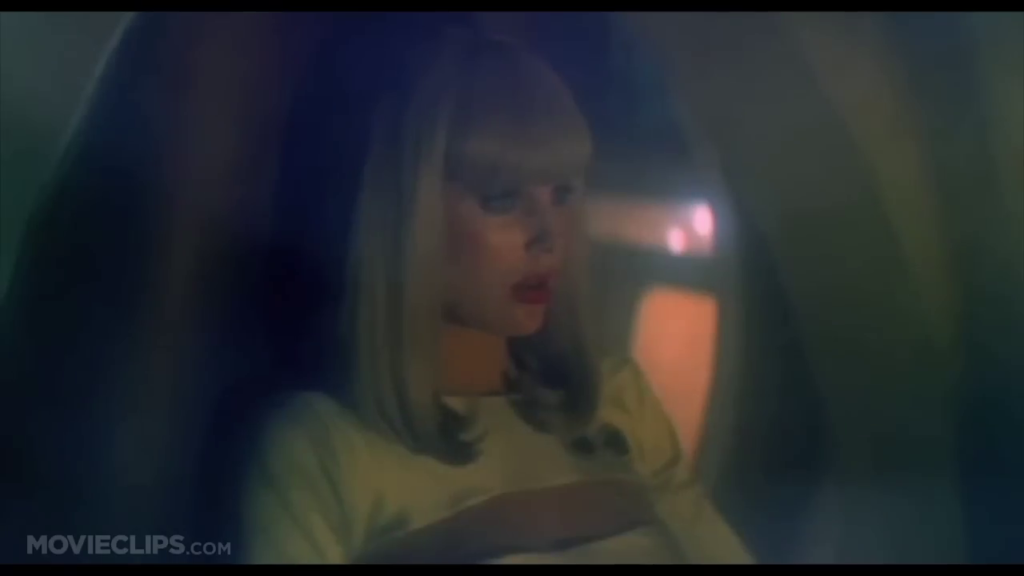
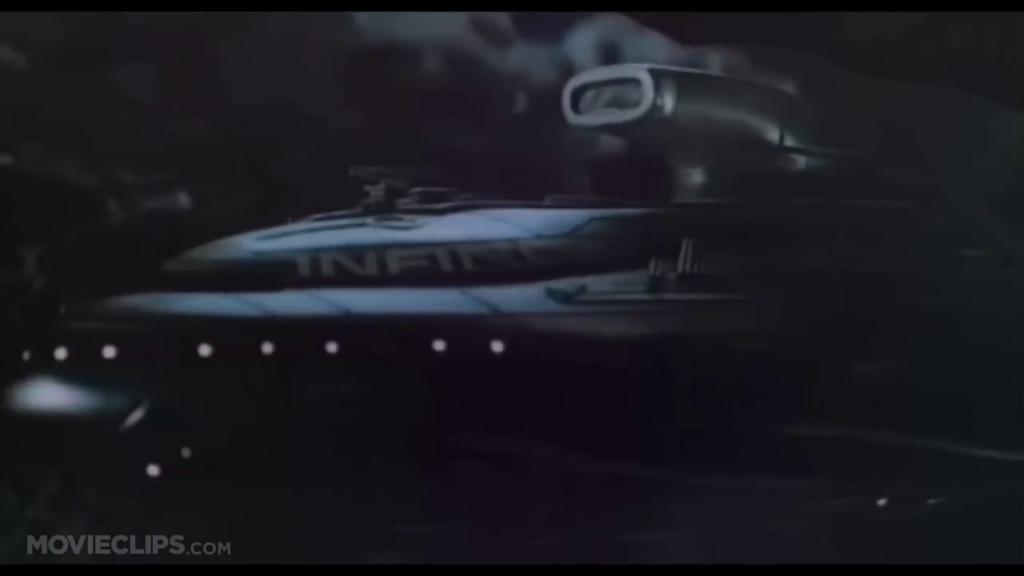
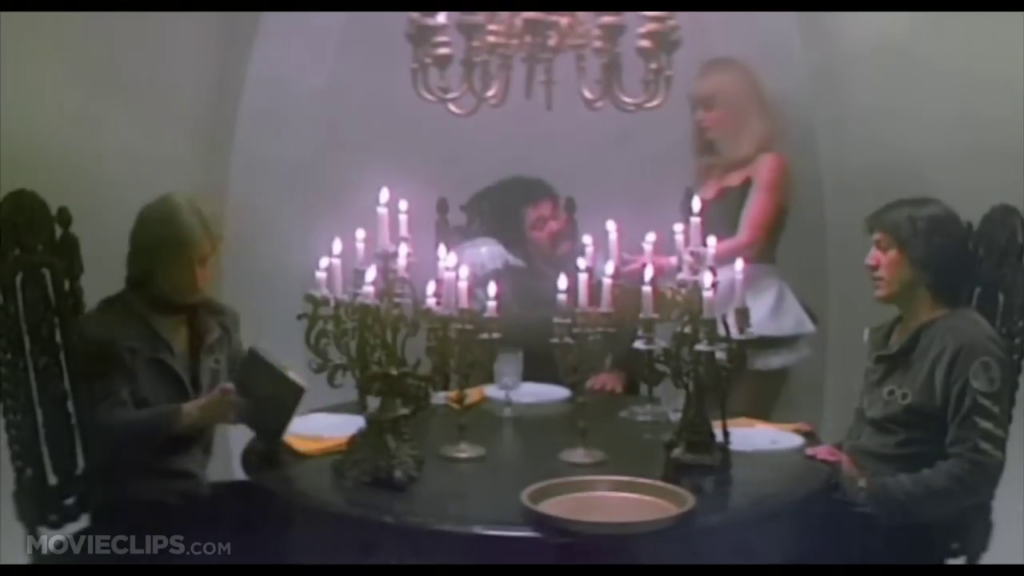
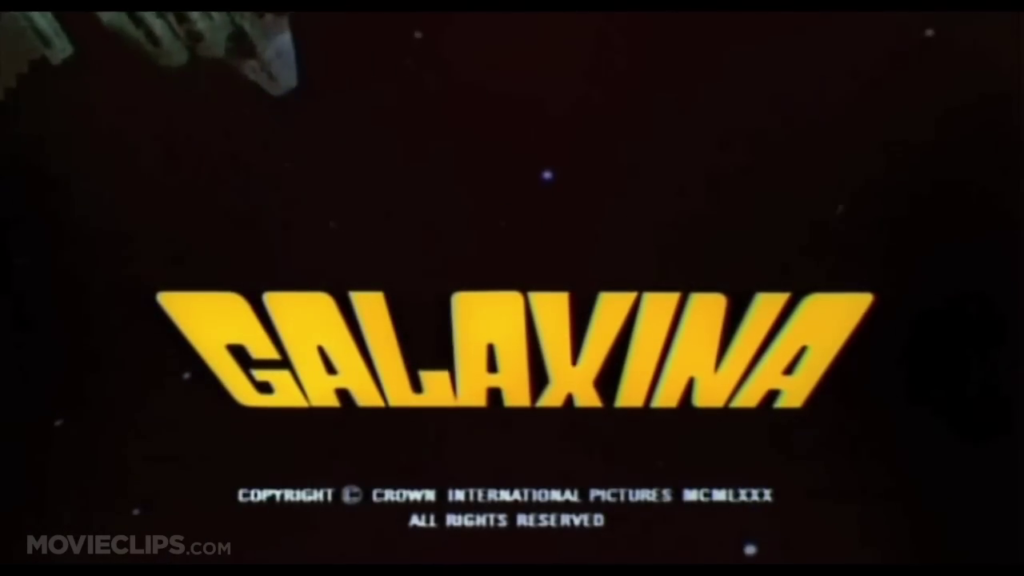
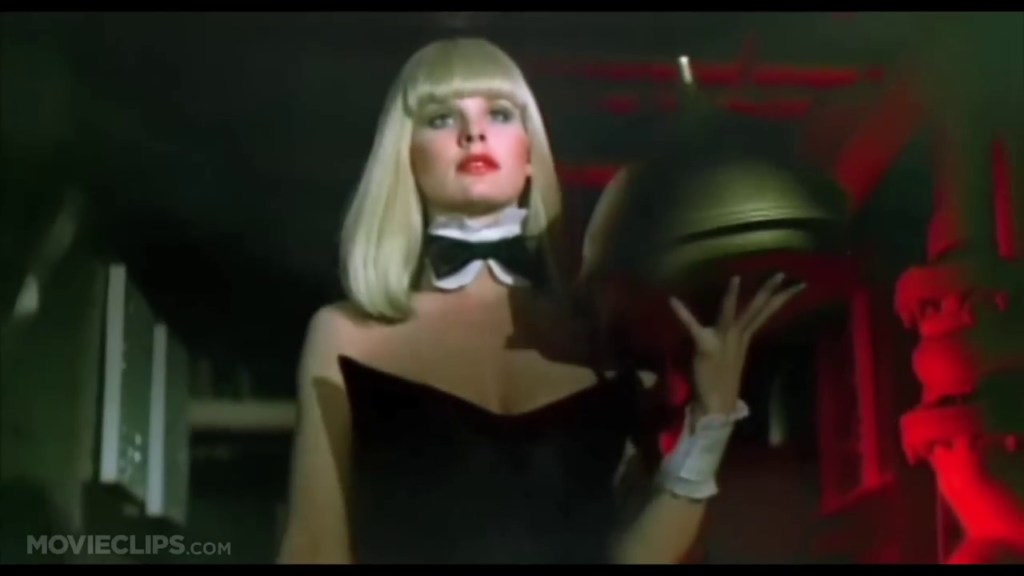
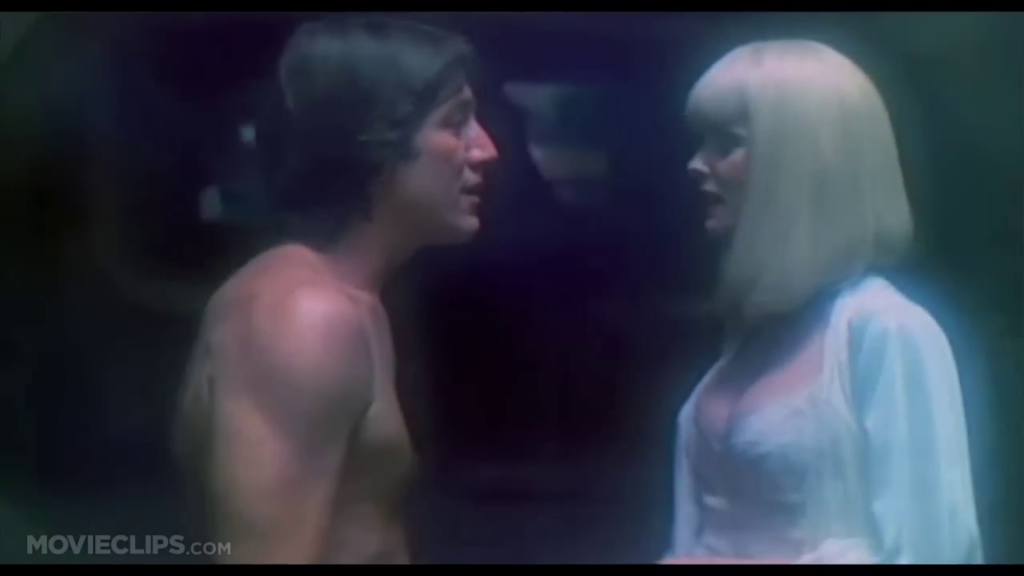
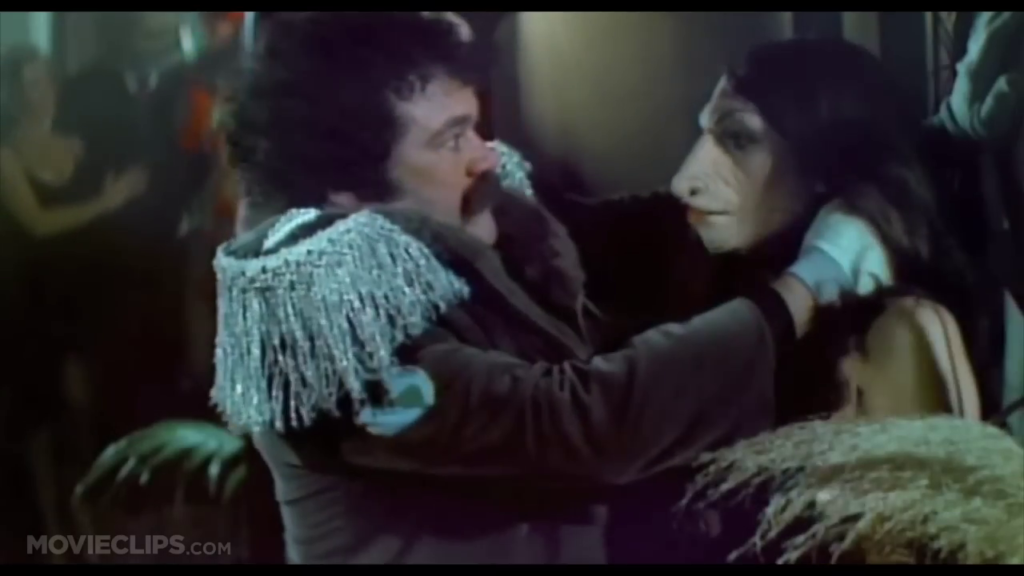
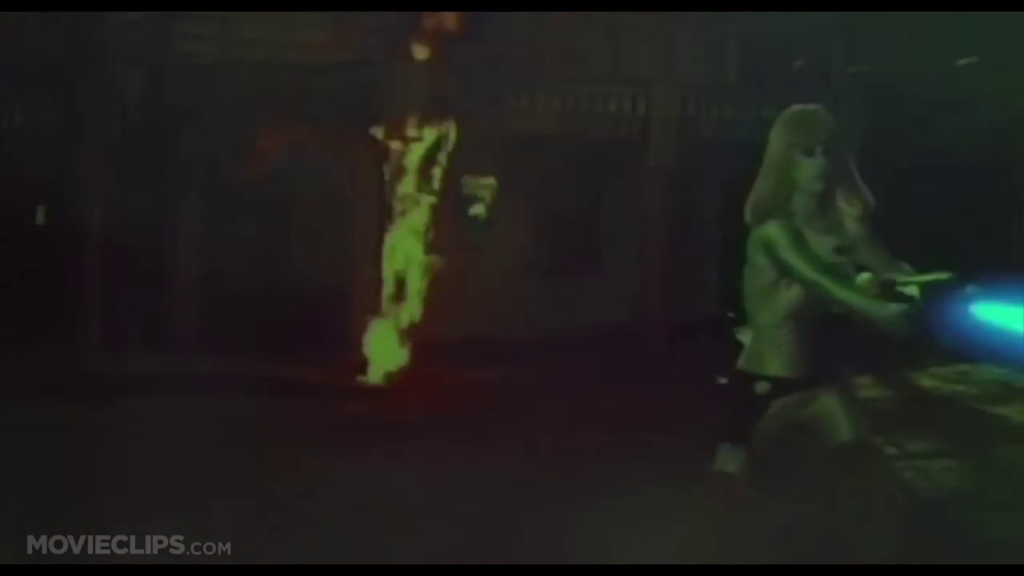
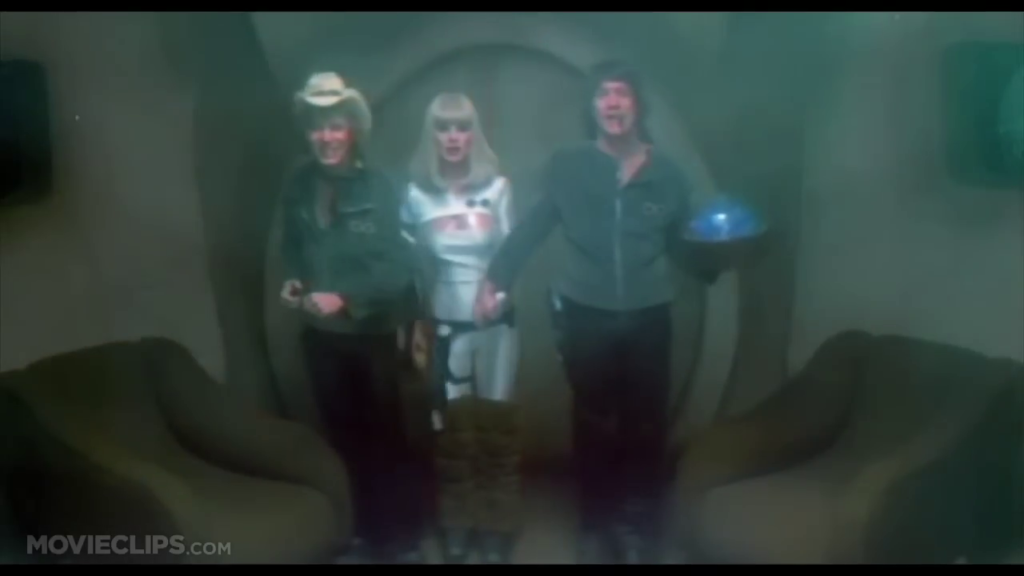
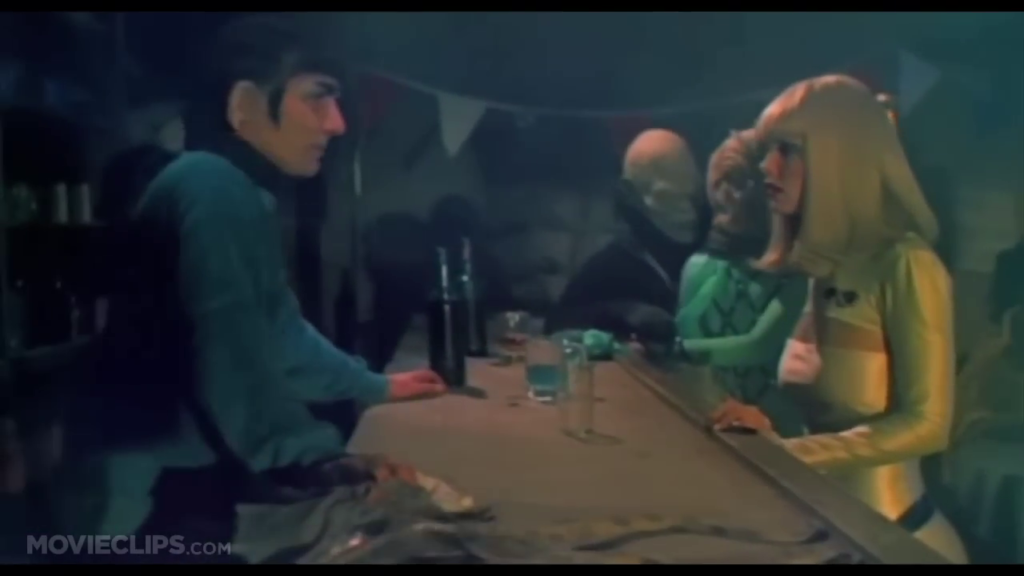
Galaxina (1980)
Film review #613
Director: William Sachs
SYNOPSIS: In the year 3008, the police space cruiser Infinity is given a mission to acquire a mysterious energy source known only as the “Blue Star.” The crew, including female robot Galaxina, set a course for Altair One, a trip which will take them twenty seven years in cryosleep…
THOUGHTS/ANALYSIS: Galaxina is a 1980 sci-fi parody film. Set in the year 3008, the space police cruiser Infinity is patrolling the edges of known space when its inept crew are contacted with a mission: to retrieve a rock known only as the “blue star,” which is a source of great energy. Sensing a chance at riches and glory, the crew embark on the trip, aided by their female android Galaxina. Being a parody film, the story isn’t the most important aspect of the experience, and is mostly an amalgamation of familiar tropes. usually this eases viewers in so they don’t get bogged down in details, and gives the comedy plenty to lampoon, but here, the problems with the plot structure and pacing severely hamper that effort. The first half of the film is essentially just empty space, where we are introduced to a crew of unlikeable characters that do little other than bicker and moan, while throwing out the occasional crass joke. For forty minutes this continues until we finally get a plot: the crew are asked to go and fetch the mysterious “blue star” rock, and have to spend twenty seven years in cryosleep to reach the planet of Altair One. While the crew is in stasis, Galaxina learns to speak and modify herself to be more human, and so is actually able to be a character of some substance. The second half of the film decides to add some parody of Western films into the mix, diluting the already weak sense of direction and purpose has even further. That said, the film does find it’s footing a bit more in the second half, with more direct parodies such as the pointy eared bartender “Mr. Spot,” and a motorcycle cult/gang who worship their mythical God “Harley David-Son.” By this point though, there’s not enough time for the film to really accomplish anything of note, and still most of the jokes just fail to land.
The film takes on the big sci-fi hitters, such as Star Trek, Star Wars, Alien and 2001, parodying them all at various points. I feel like the film is aimed at a sci-fi audience rather than a general one, but the jokes just don’t go deep enough for that purpose. The choir sound effect whenever someone mentions the “blue star” is the only time the film breaks the fourth wall, and again it just feels like a joke thrown in there because the more types of humour the film can cram in, the better (spoiler: it’s not better). You can overlook the barebones production and effect because that’s part of the old sci-fi experience, but that said, the practical models of the ships are fairly nice. As mentioned, the characters are all fairly unlikeable, even Thor, who provides Galaxina’s love interest, and perhaps is meant to be the most “normal” of the crew, is devoid of any real personality other than being horny. Galaxina has some idea of what it wants to be, but the poor pacing makes it too easy for viewers to get lost. The humour and jokes constantly miss their landing, and an overreliance on crude humour ages the film poorly too. The film finds some footing eventually, but at that point, it’s too late to redeem it, and it just doesn’t achieve anything remarkable. There’s much better sci-fi parodies out there, and this one should probably be left on the fringes of known space.
-
#612 – 24 Hours to Live (2017)
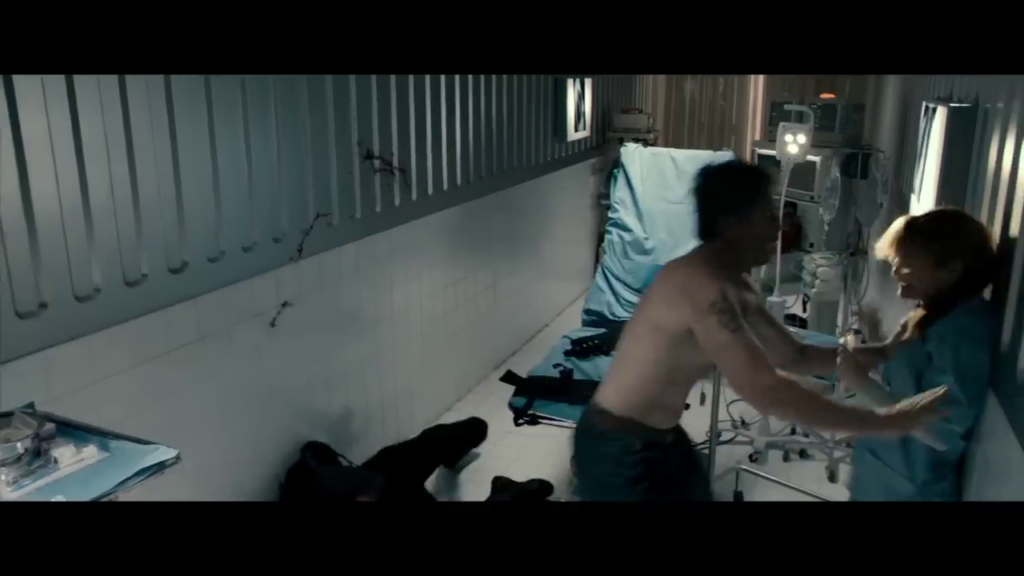
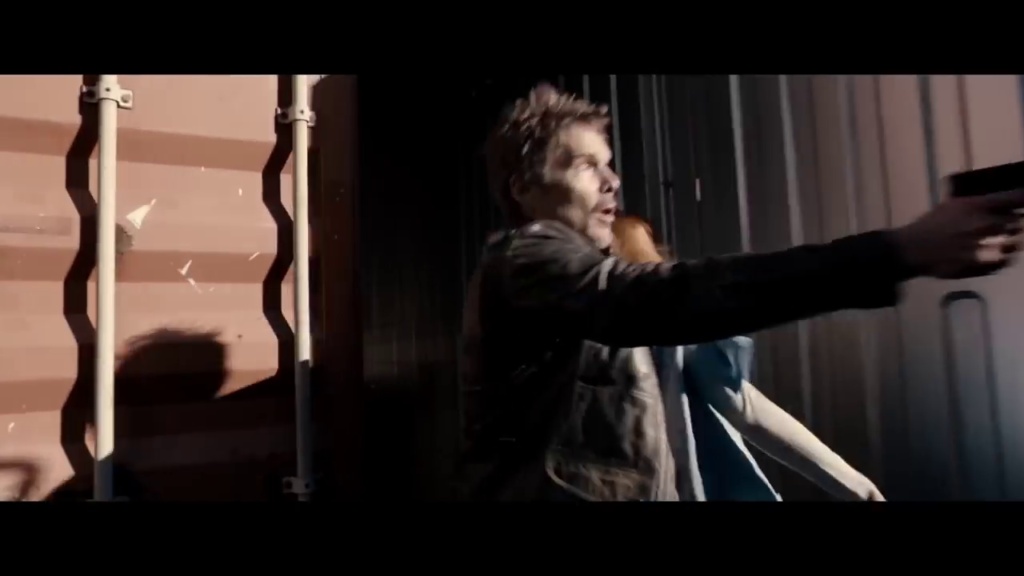
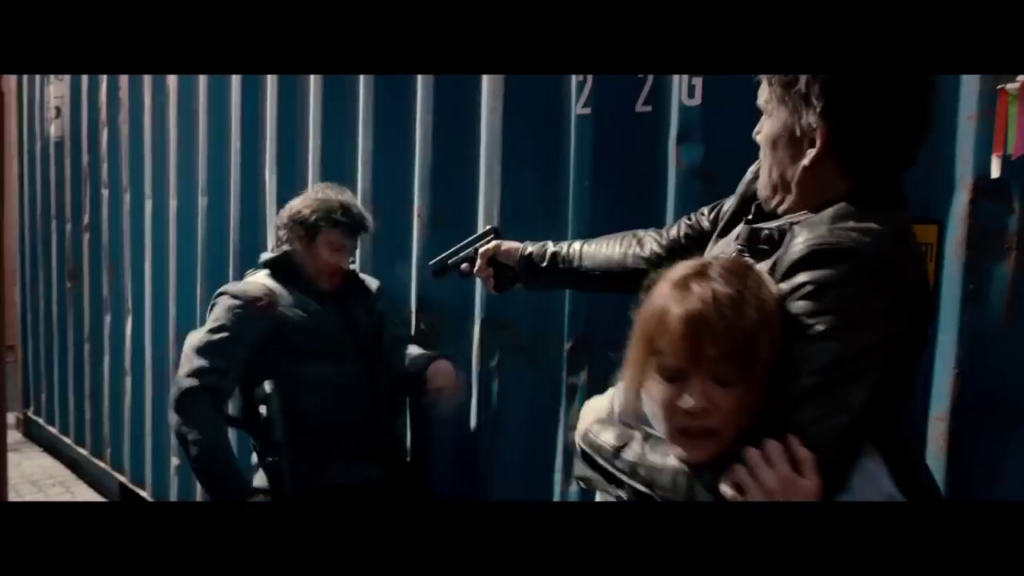
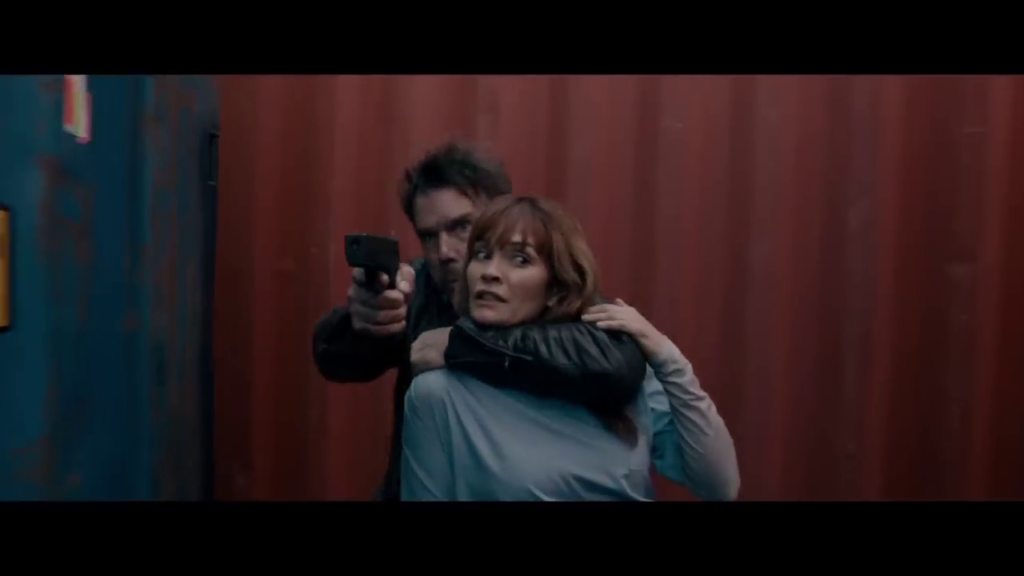
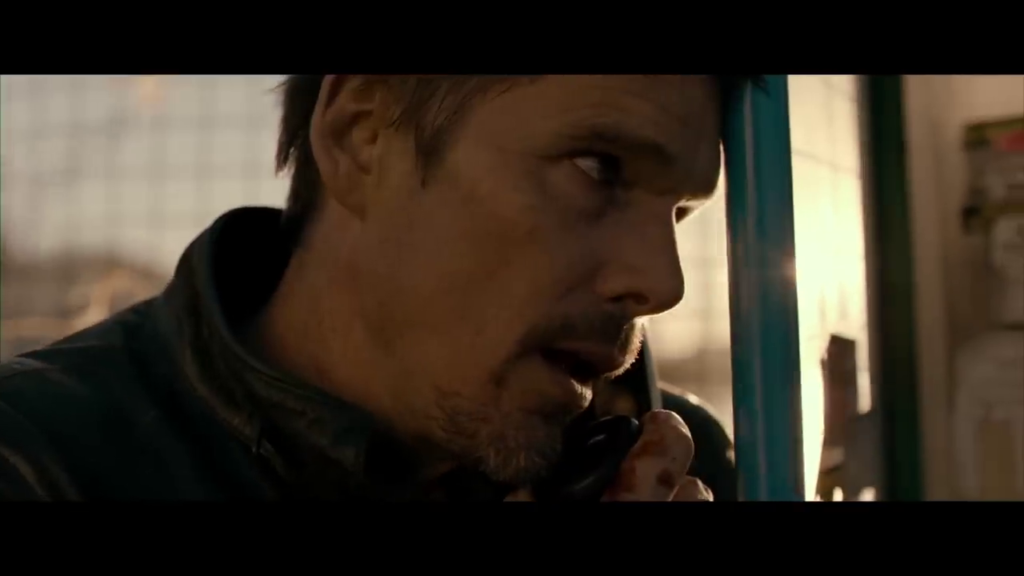
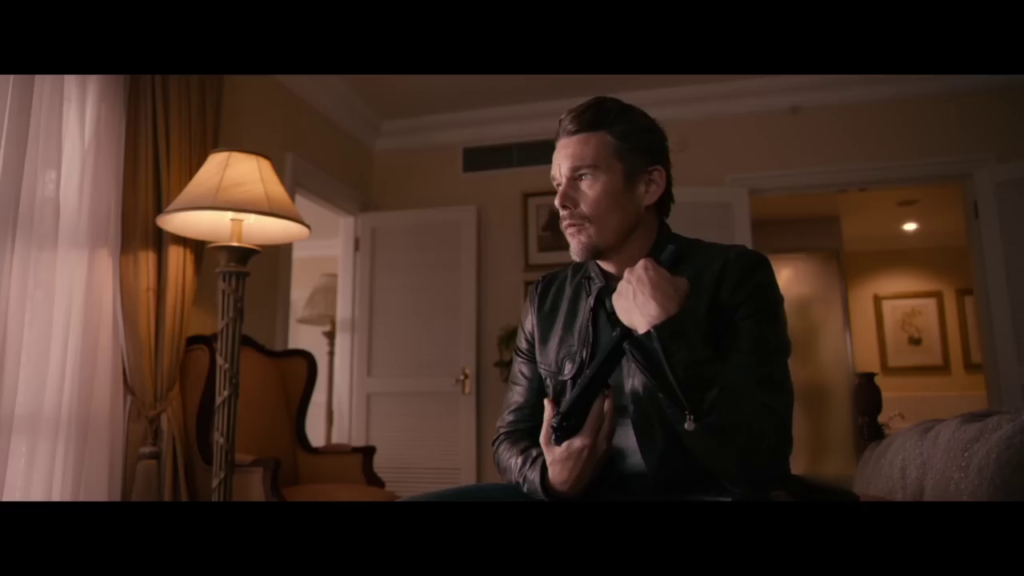
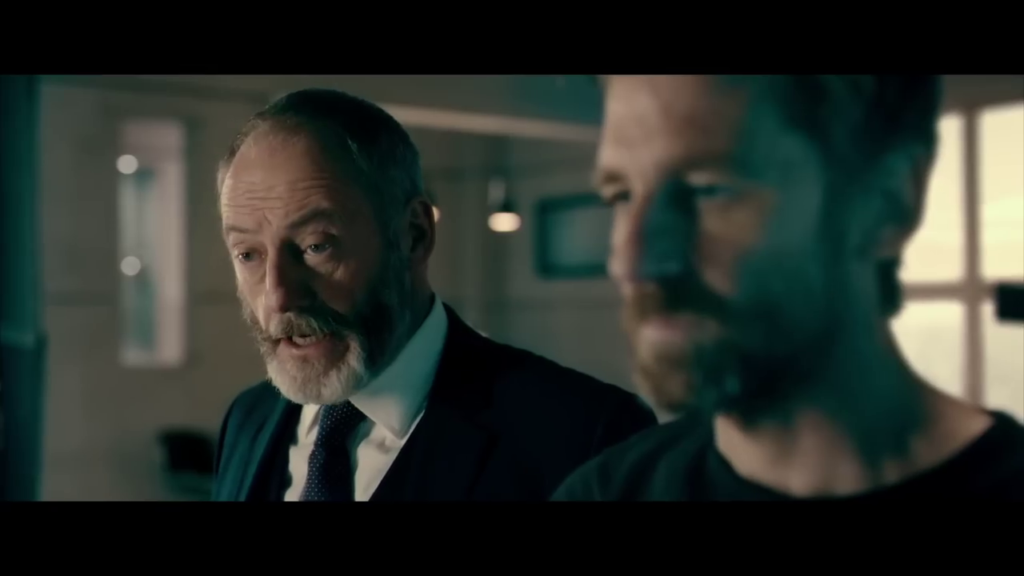
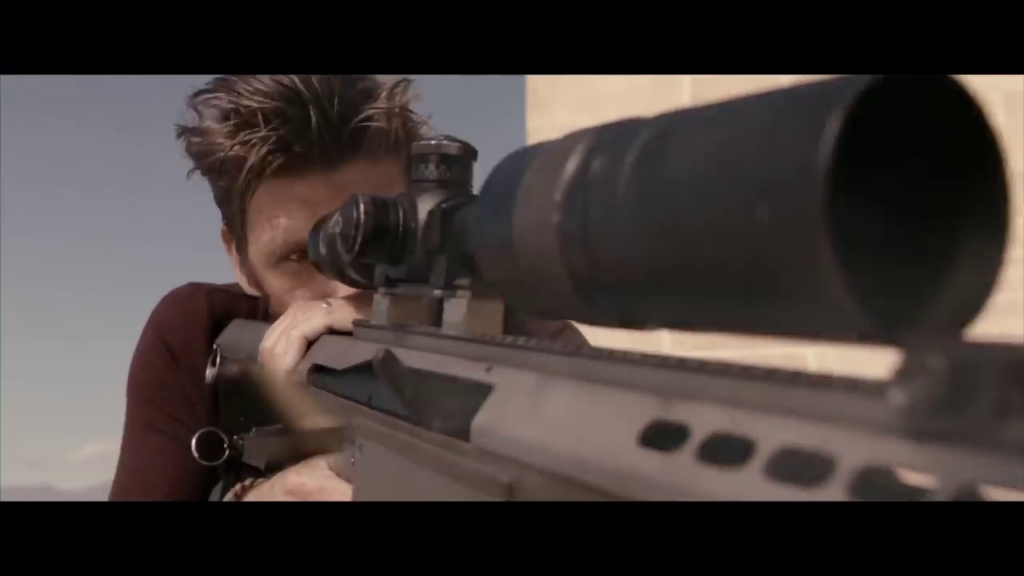
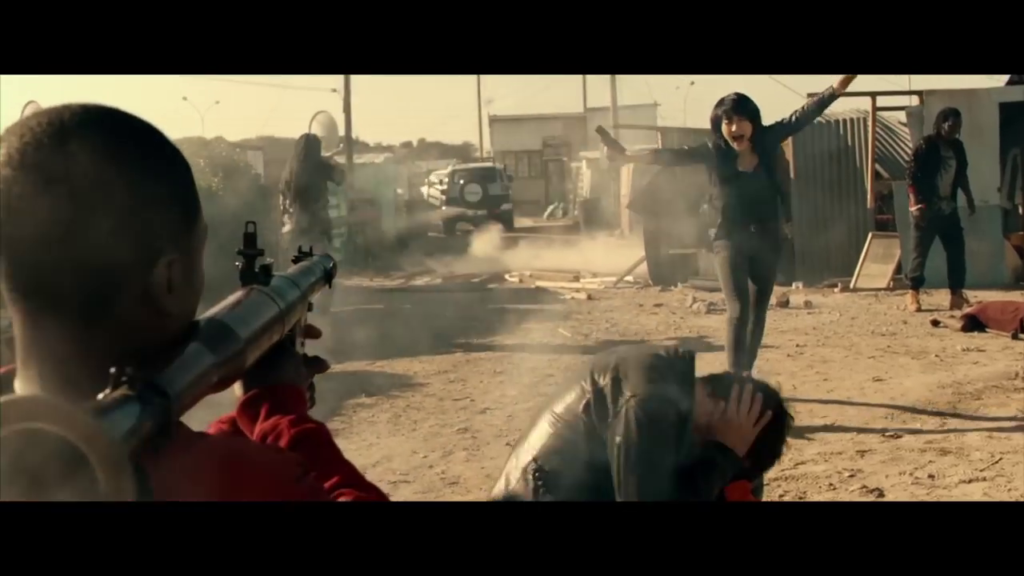
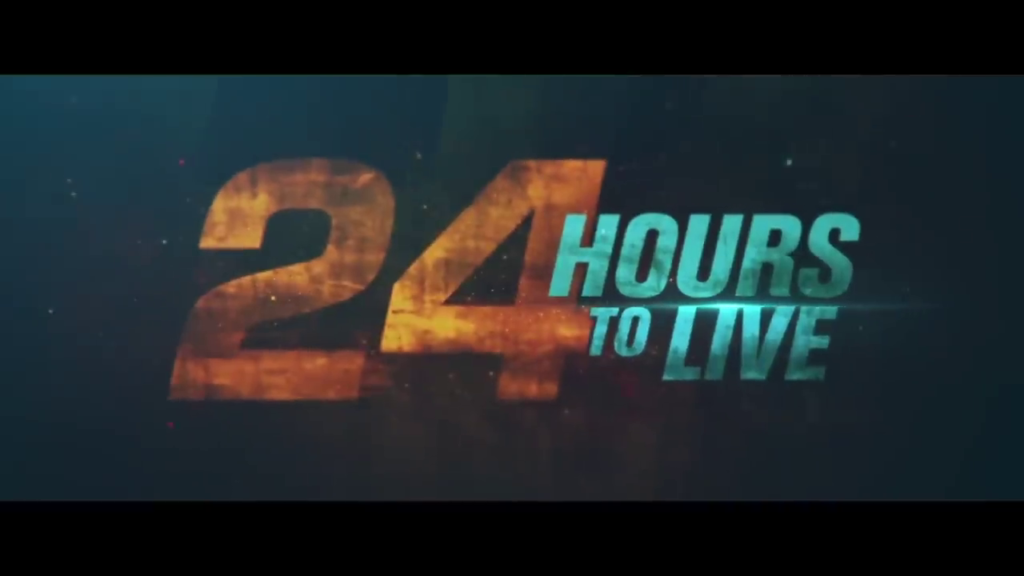
24 Hours to Live (2017)
Film review #612
Director: Brian Smrz
SYNOPSIS: Travis, an Assassin working for a powerful agency is killed while on the job, but is brought back to life with an experimental drug to get information that died with him. Attempting to kill him when this is done, Travis escapes and teams up with Lin, the Interpol agent who killed him, to get revenge on his former employers…
THOUGHTS/ANALYSIS: 24 hours to Live is a 2017 science-fiction action film. Travis is an assassin who is roped into a job to take out an informant before he delivers evidence that will bring down the agency he works for. When he is killed by the Interpol agent protecting the informant, the agency resurrects him with an experimental procedure to get the information for him, but try to kill him again when he gives it them. On the run from the agency that hired him, he engages on a mission of revenge, by teaming up with the Interpol agent that killed him. Made by the producers of John Wick, the film clearly makes use of their previous experience on that film, as it is primarily an action-fest, full of shooting, running, fighting, and the sort. It does differ from John Wick though, as there is actually space in between action scenes, and there’s more of a static camera in place of the close-up, shaky shots that immerse you in the action and never let you go. As such, the film falls into very standard action film territory, with not much to distinguish it. The film does have a story, but as always with action films, it is not the most important aspect of the film. It serves its purpose for the most part, but there’s some elements that don’t really need to be there. There’s sometimes a bit too much padding between the action scenes with bits of story, but on the whole it’s not too distracting.
Ethan Hawke in the lead brings enough grit and energy to the role to keep the film entertaining, backed by a familiar backstory of having his family killed, you’ll recognise all the twists and turns the film throws at you. The setting of South Africa provides something a little bit different, but not too much. Overall, 24 Hours to Live is a one-time watch that has enough action and entertainment to see you through to the end. Relying on typical story points that won’t leave much of an impact, there’s still plenty of energy in the action that will distract you throughout the runtime.
